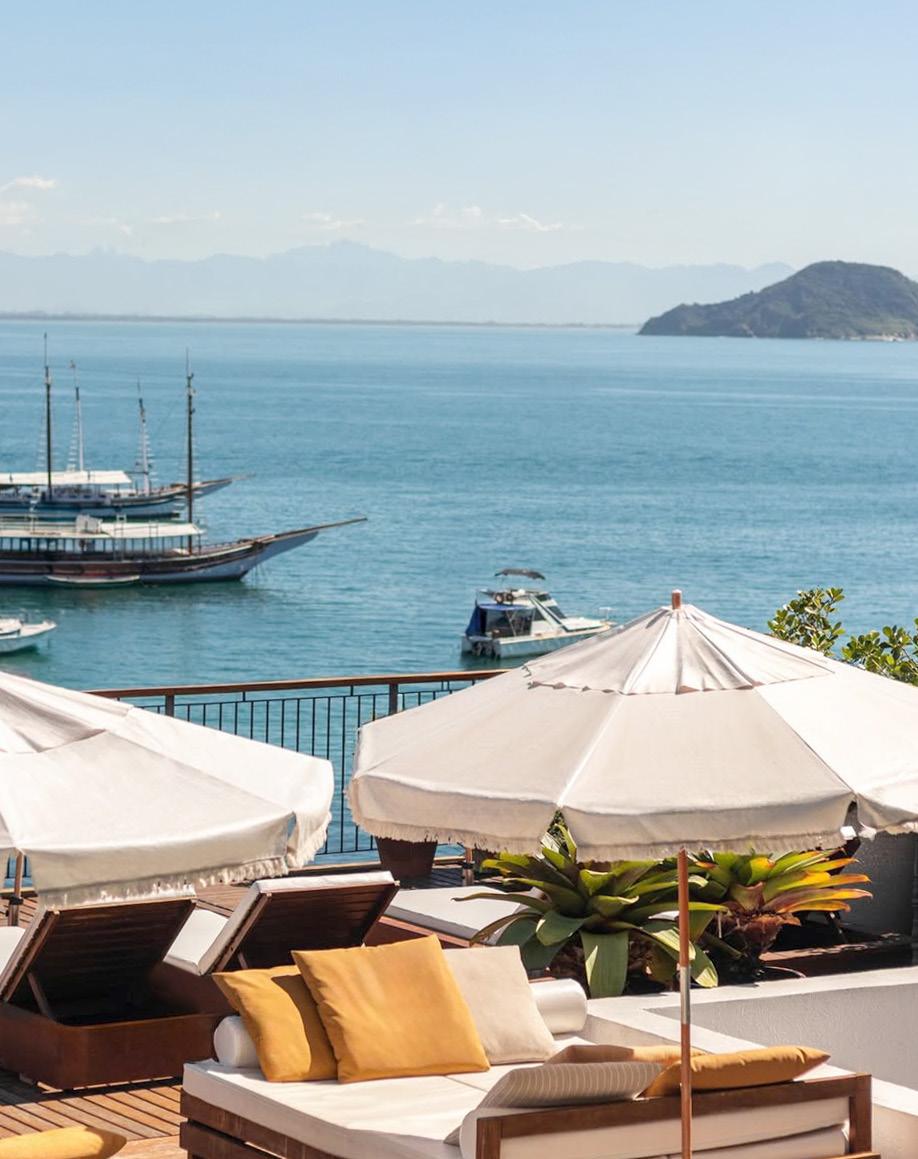
RUSTIC MEETS RIVIERA
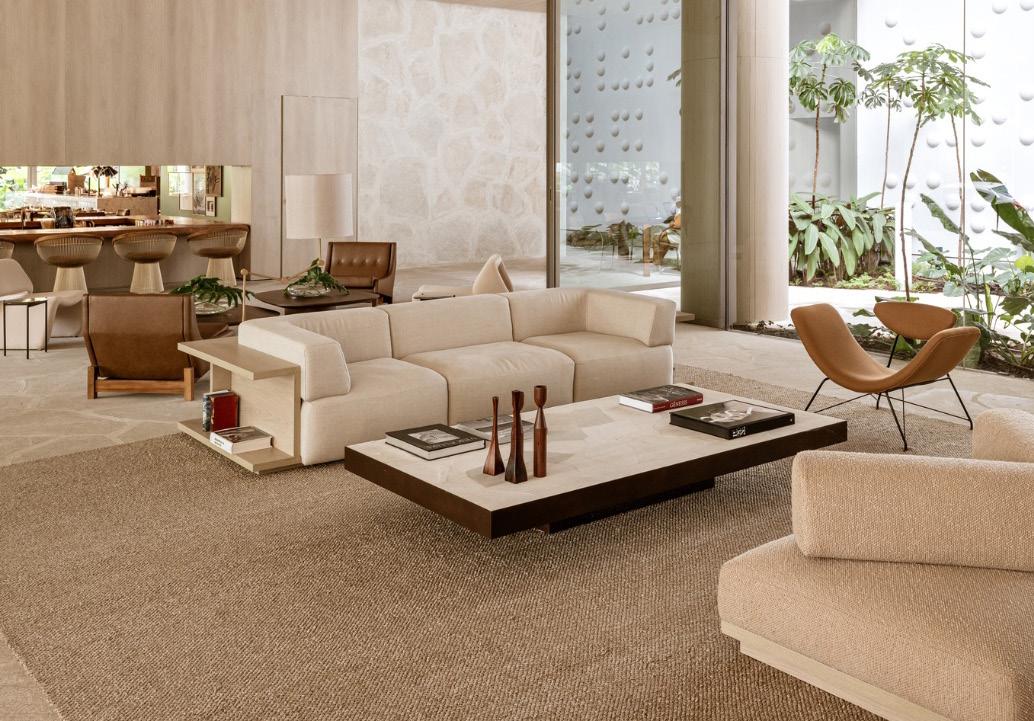
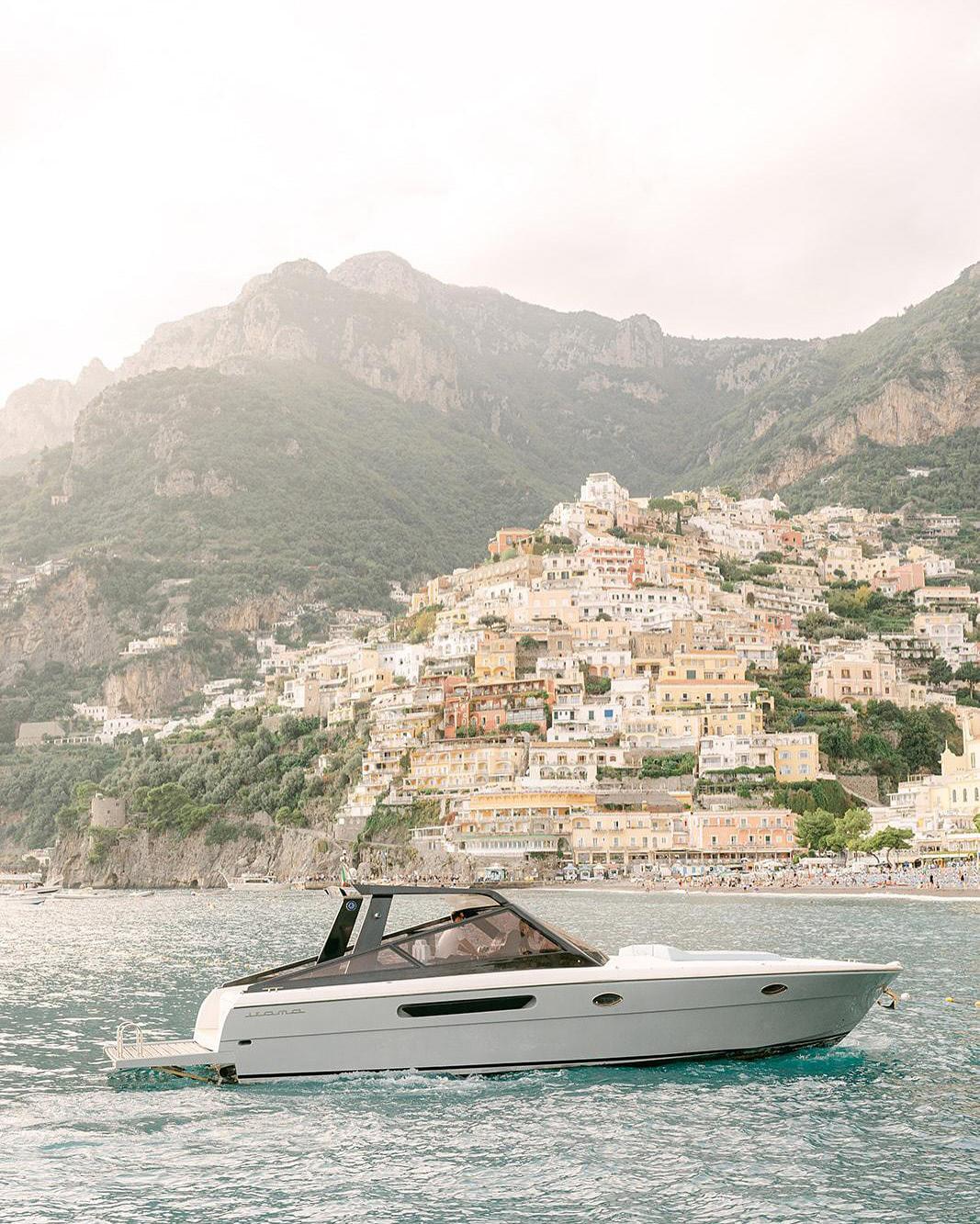


@the.rume / @rumemagazine




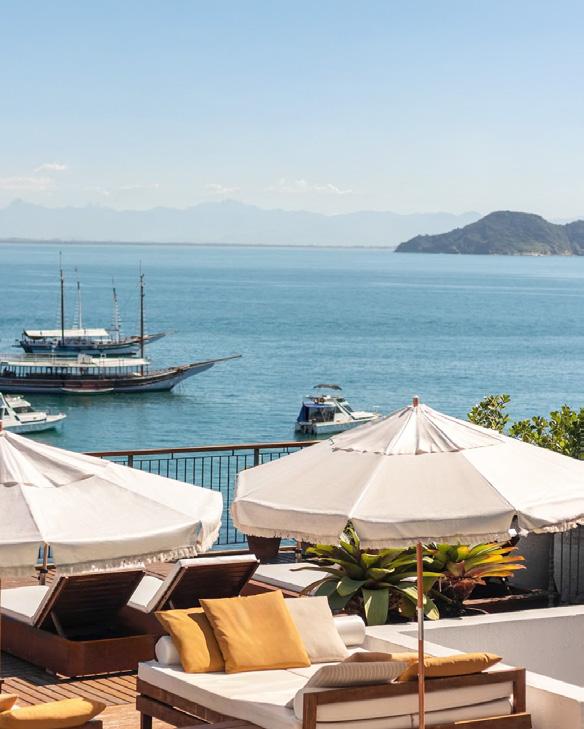






@the.rume / @rumemagazine





We begin this issue at Casas Brancas in Búzios, Brazil, a retreat so enchanting it immediately captured our hearts. This timeless haven effortlessly blends serene luxury with Brazilian charm, providing an unforgettable escape from the everyday. In São Paulo, we've uncovered Pulso Hotel, a stunning contemporary property bringing a fresh energy to Brazil's vibrant urban scene. Its design-forward approach sets a new standard in hospitality that really has to be experienced first-hand to understand. Across the Atlantic, we introduce you to Soho House's newest venture – a charming farmhouse in Ibiza that elegantly combines rustic authenticity with Riviera sophistication. And speaking of Europe, immerse yourself in the beauty of the Amalfi Coast, discovering our handpicked selection of the best spots to experience the true art of a European summer. Make sure to add them all to your bucket list this season! Back in the UAE, Ras Al Khaimah's iconic luxurious beachfront destination, RitzCarlton Al Hamra Beach, offers a perfect Gulfside retreat, while China Tang expands its global culinary footprint, promising another exceptional dining experience. Don’t miss our deep dive into Lacoste, as well as a look at the steps in their journey so far in light of their newest cafe concept, an exploration of La Casa, a hidden gem of a wine bar, and the Ritz-Carlton Yacht Collection’s anticipated arrival in the Maldives, promising unparalleled maritime luxury. Enjoy the issue!
EDITOR-IN-CHIEF
ELISE KERR elise@the-rume.com
MANAGING PARTNER
PAULO EDUARDO COSTA paulo@the-rume.com
LEAD DESIGNER
DOROTHY CASTILLO
VISUAL STRATEGIST
TIN IGLESIAS
JUNIOR EDITOR
ANDREA MORCO
GRAPHIC ASSISTANT
KIMBERLY CO
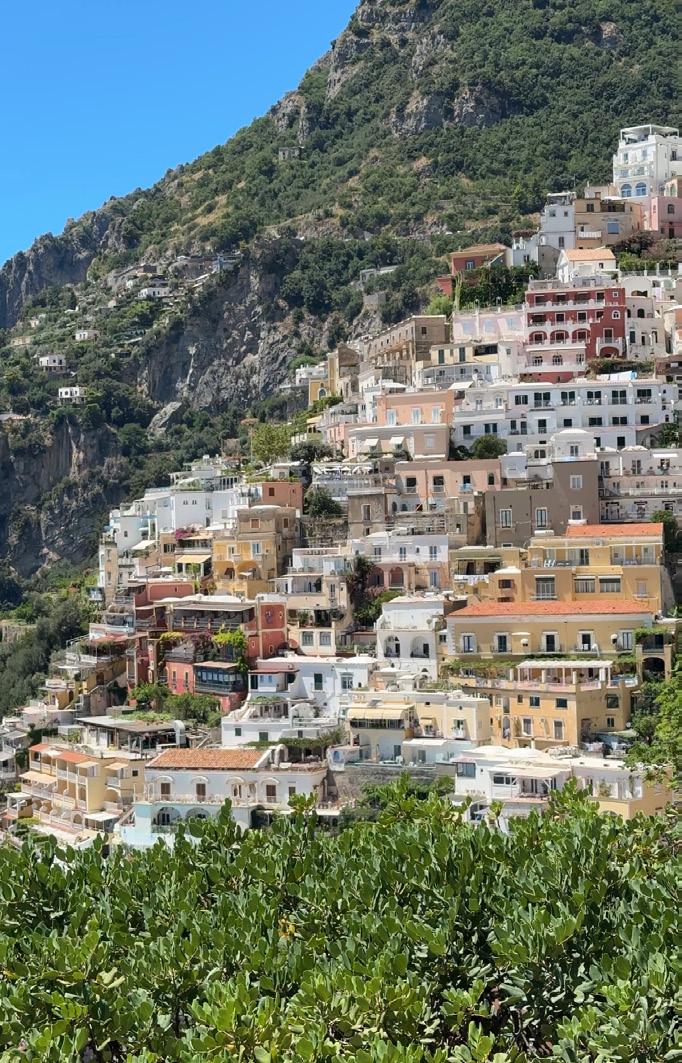
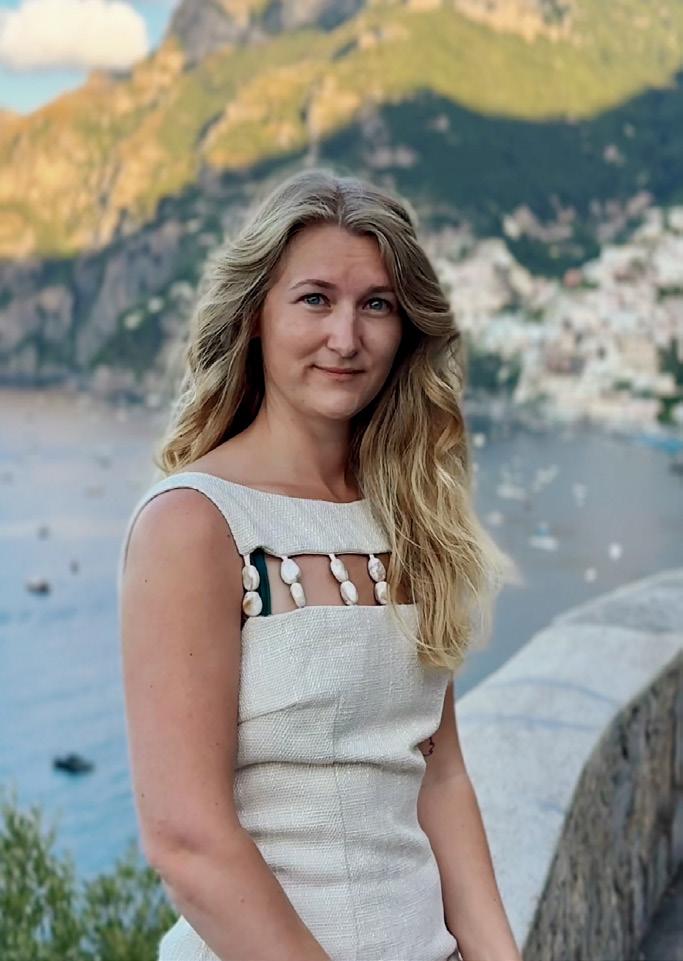
Design, nostalgia and service come together at Casas Brancas Búzios
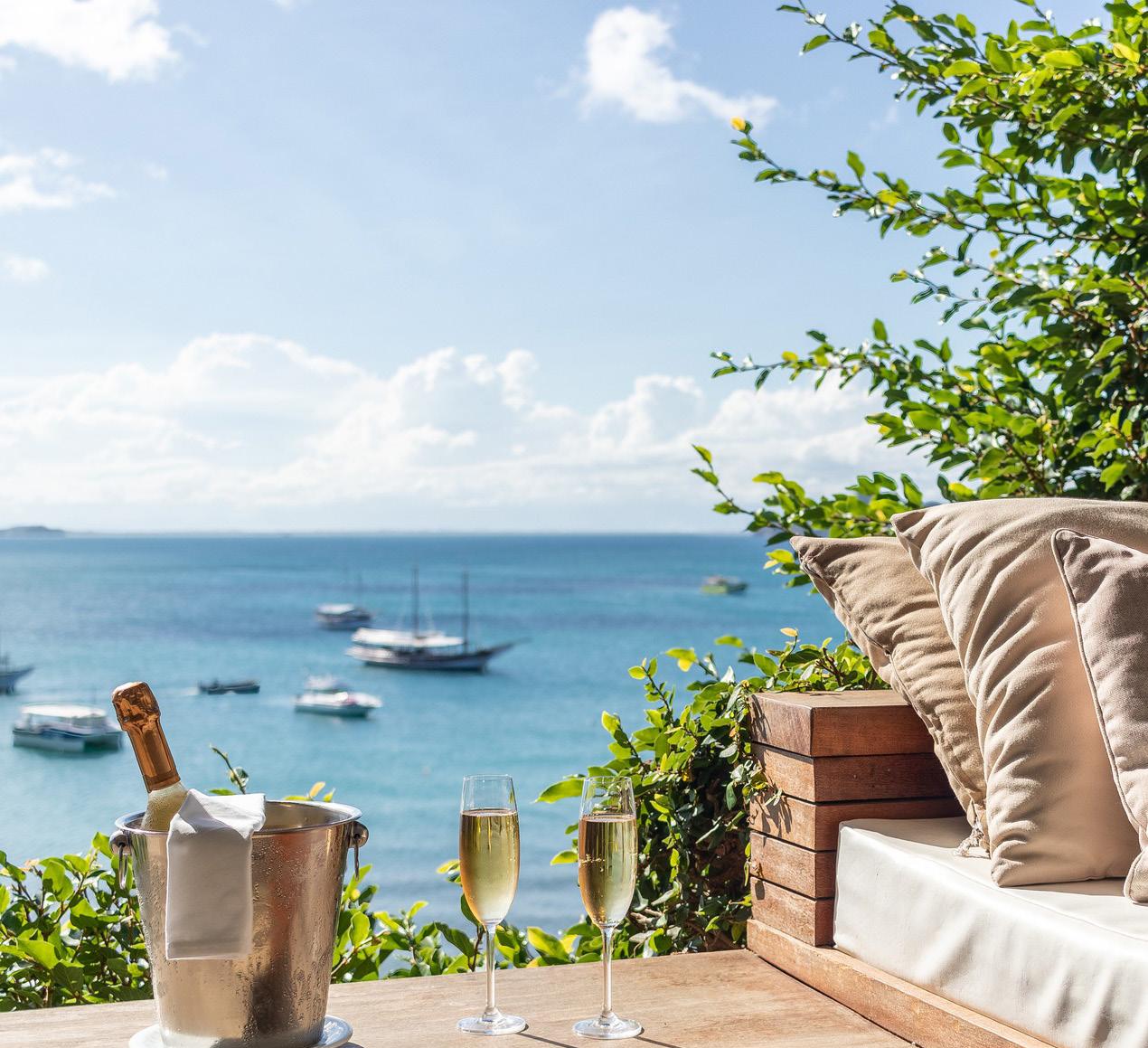
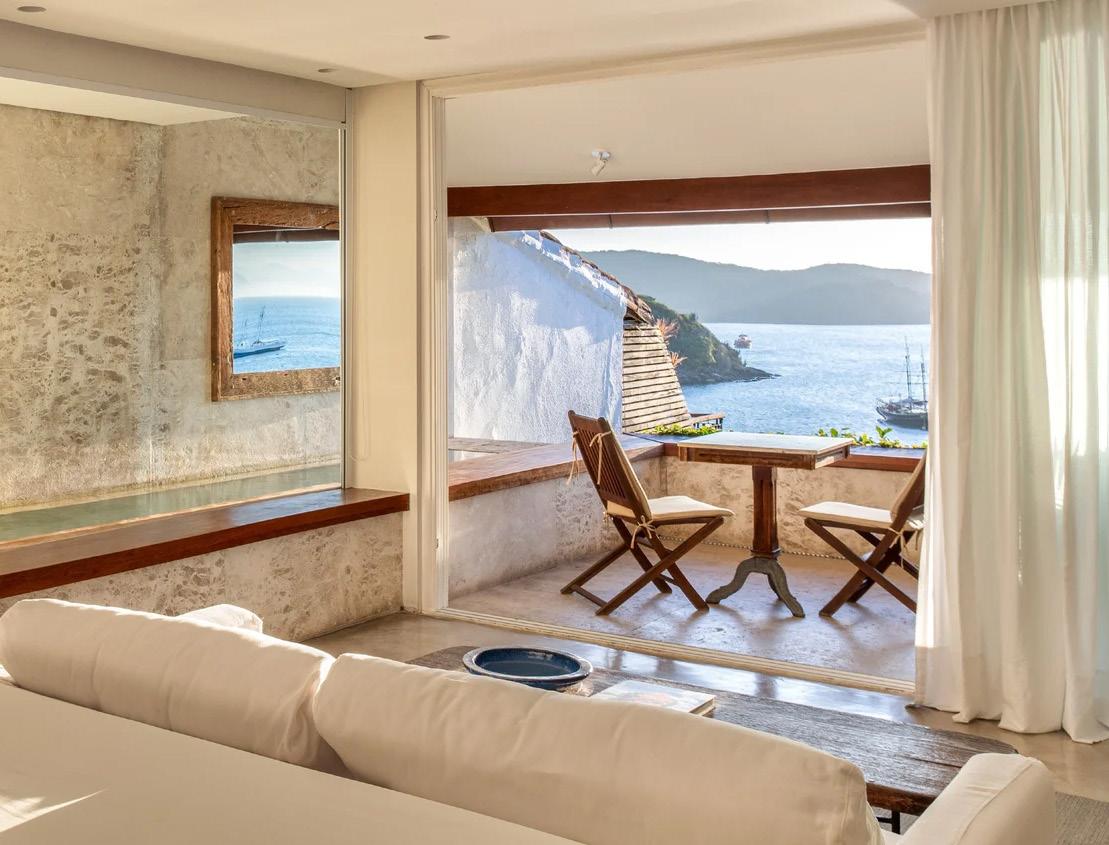
Búzios has always held a special place in my life. A town woven into my childhood, it remains a soothing contrast to the chaos of Rio – especially when visited outside the carnival highs. Returning after so many years felt both familiar and new. This time, I chose to stay at Casas Brancas Búzios, one of the town’s most storied hotels, and I can confidently say it now stands as my
favourite property in Búzios. Perched above the famed Orla Bardot, the hotel enjoys a privileged location – just a few minutes’ walk from Rua das Pedras, Búzios’ lively artery of restaurants and boutiques. But while the setting delivers atmosphere, it’s the hotel itself that quietly impresses. Each room is uniquely styled and flows with the organic architecture of the property. My room was modest in size, yet incredibly warm and personal, bathed in soft shades of white and decorated with understated, coastal touches. From the terracotta plant pots to the creamy textiles and aged timber furniture, everything felt grounded and thoughtful. Upon arrival, a few delicate brigadeiros and beijinhos awaited in miniature coffee
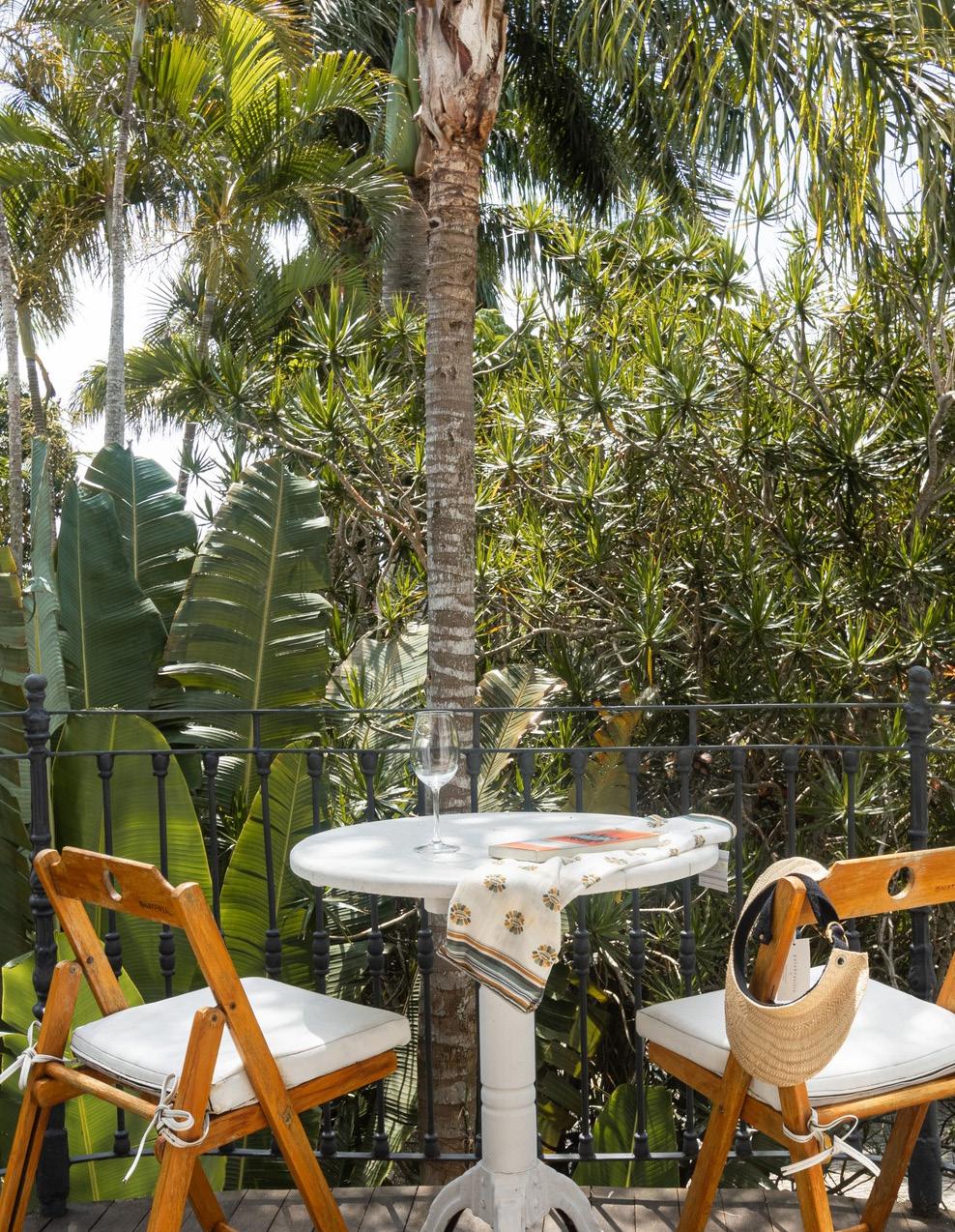
cups – a small but memorable welcome that immediately set the tone. The bed was supremely comfortable, the bathroom details were refined, and the balcony offered quiet views out to sea, framed by bougainvillea and the curve of the bay beyond. The main pool is set against a sea-facing terrace framed by whitewashed beams and Mediterranean greenery. On our first afternoon, we lounged poolside, sipping Aperol Spritzes as the sun slipped into the
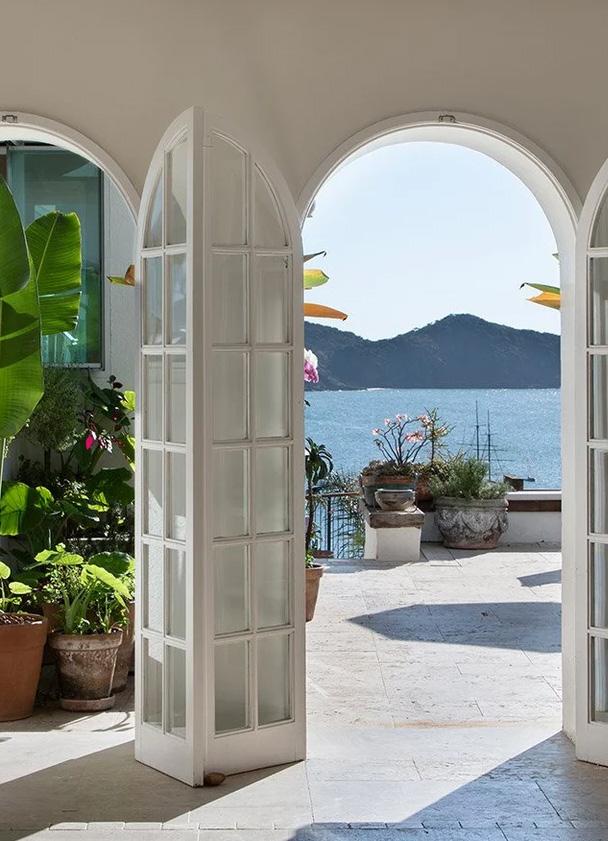
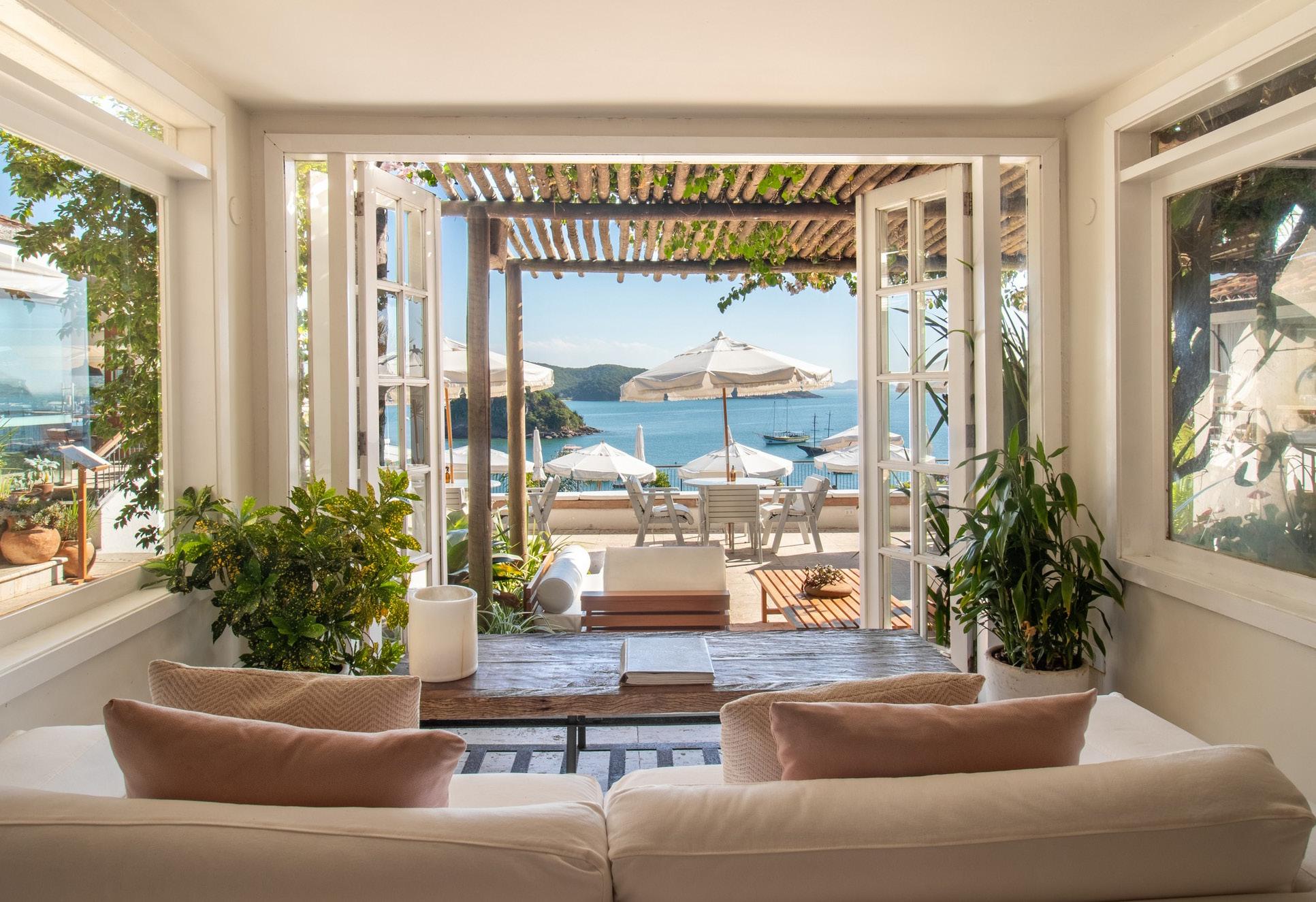
horizon – a classic Búzios sunset moment made even better by the laid-back vibe and attentive bar team. Later that evening, after a walk through Rua das Pedras, we returned to dine at 74 Osteria, the hotel’s Italian restaurant set directly on the promenade underneath Casas Brancas Búzios. The space glows with ochre walls, trailing plants, and candlelit tables. We enjoyed a beautifully plated parmesan-
crusted pasta and a comforting homemade ravioli – both dishes felt honest, hearty and polished. The option to order a half bottle of wine was a nice touch, particularly after a day of poolside sipping. Breakfast is served on an upper terrace just above the pool, offering panoramic views over the bay. The layout includes a compact buffet of pastries, fruit and yoghurt, complemented by a small à la carte menu. I opted for a
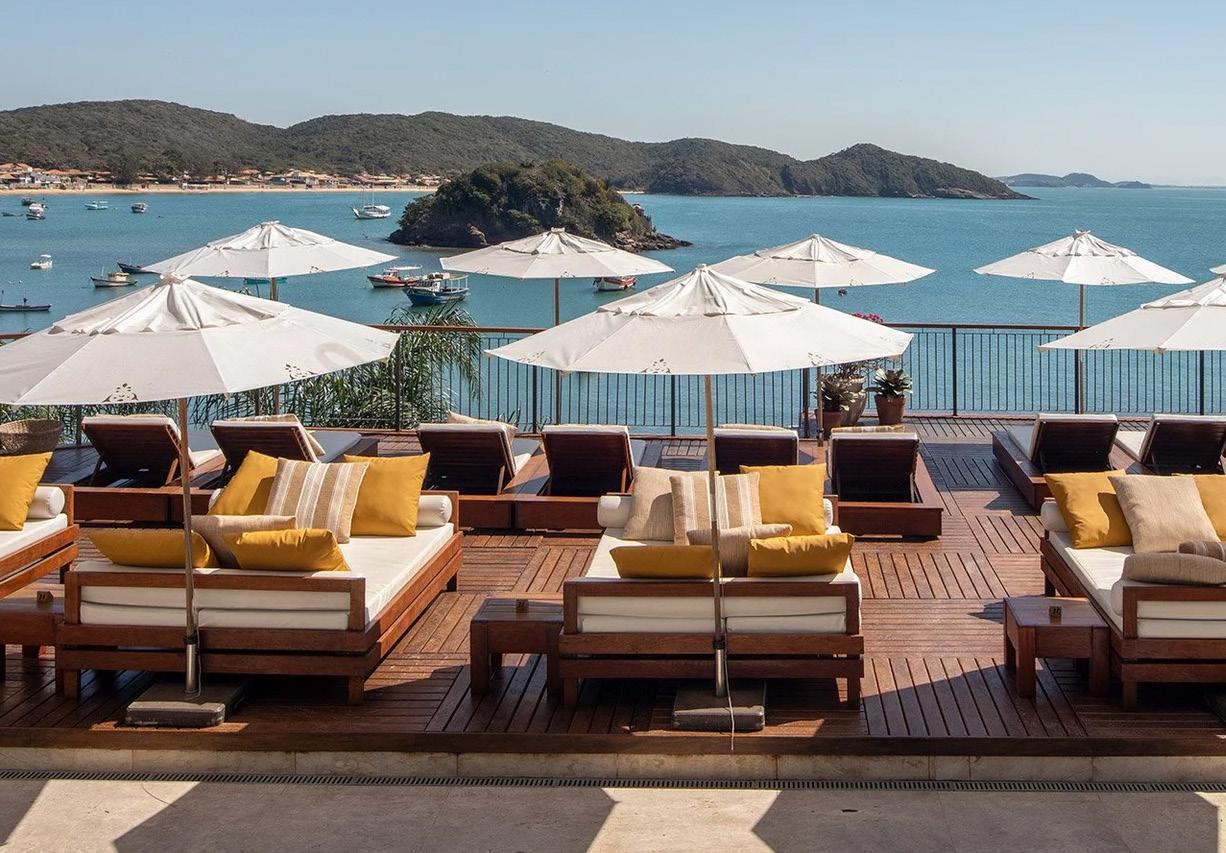
classic Brazilian tapioca filled with ham and cheese, followed by a fluffy stack of pancakes. The coffee was strong, and the setting made everything taste better. Although we could only stay one night, the team extended the warmth of the experience by allowing us to enjoy the facilities postcheck-out. We returned from a visit to two of Búzios’ most iconic beaches – João Fernandes and Ferradurinha – to spend our final hours swimming and lounging. The pool, with its perfect water temperature, was a standout. A simple fish and chips plate, along with light snacks and a mini bottle of champagne for my partner, kept us content until departure. What stood out most – beyond the setting and design – was the service. From the receptionist who checked us in early without hesitation, to the poolside staff who joked and conversed in English (a rarity in Brazil), everything felt genuine. Having visited the seaside town countless times, I now wonder why it took me so long to stay at Casas Brancas Búzios. It strikes a rare balance –charming without being cliché, elegant without pretence, and local without losing sight of international comfort. It feels like a place you return to not because it surprises you, but because it calms you. casasbrancas.br
Returning to São Paulo after many years away brings with it a certain expectation – a city known for its relentless energy, where business and art intersect in dizzying layers. But arriving at Pulso Hotel, tucked discreetly into the leafy enclave of Jardim Paulista, offers a different rhythm entirely.
It was the greenery that struck first – mature trees and tropical foliage envelop the building, softening its clean architectural lines and hinting at what’s to come. Check-in took place at a private desk, quietly efficient and informal.
Within minutes, I was heading to the room, past a softly lit lobby that felt more like a collector’s drawing room than a hotel entrance.
Pulso's interiors are rooted in elegant minimalism – a blend of natural textures, neutral tones, and curated pieces that evoke the feeling of a private residence. Our room, while compact, felt warm and inviting. Wooden detailing, structured lighting, and calming tones created an immediate sense of ease. There’s a deliberate absence of fuss – nothing flashy, nothing excessive. It’s a space that invites you to unwind, not perform. A detail worth noting: the blackout system. More than a standard curtain, it creates true darkness — a rarity in hotel rooms. The combination of silence, comfort, and complete blackout allowed for ten hours of uninterrupted sleep. Breakfast at Pulso is plated rather than buffet-style – a considered touch that avoids waste and feels distinctly refined. Tropical fruits, fresh pão de queijo, and a delicate sandwich with queijo minas all arrived in modest, well-composed portions. The only difficulty was the
cappuccino. Despite being Brazilian, finding a proper espresso-based cappuccino in São Paulo can still be surprisingly elusive. At first, I was served something closer to an Americano with foamed milk. It wasn’t until later in the day, at Pulso’s adjacent café, that I found a version closer to what I was after. That experience – and the next morning’s resolution – speaks to the strength of Pulso’s service. Upon asking for the café-style cappuccino at breakfast, a staff member didn’t hesitate. “I’ll bring one from the other bar,” he said, returning minutes later with exactly what I’d hoped for. There’s no overcompensation, no rehearsed lines –just thoughtful, quiet action.
Pulso’s public areas are a masterclass in modern Brazilian design. The palette remains neutral, but the material choices – stone, wood, soft textiles – add depth and texture. Seating areas near the bar and café are low and sculptural, inviting long conversations or simple stillness. There’s an indoor pool tucked
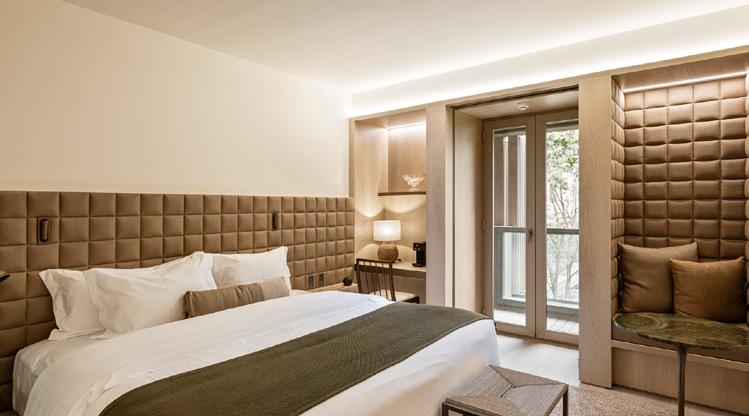
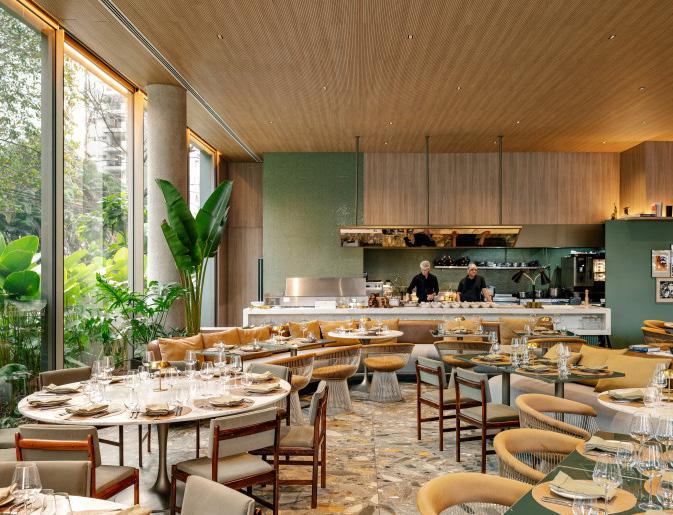
behind vertical louvres, its long, narrow form better suited to morning laps than leisurely lounging.
Pulso Hotel doesn’t try to impress through grand gestures or overt luxury. Instead, it wins through atmosphere, balance, and an evident respect for its guests’ comfort. From the double blackout to the tailored breakfast, from the minimal lobby to the long corridor of still water, there’s a calm and intentional rhythm here. It’s a hotel that feels more like a well-kept secret – the kind of place you return to not because of spectacle, but because of how it made you feel. pulsohotel.com
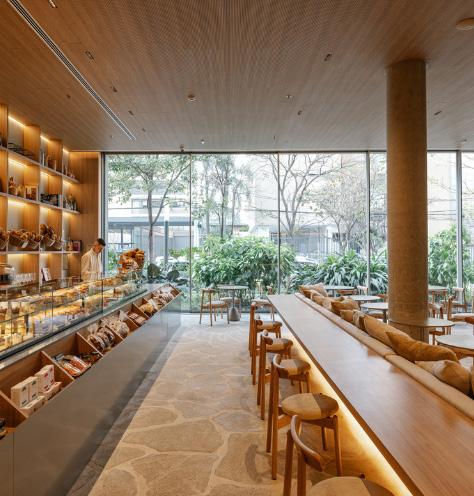
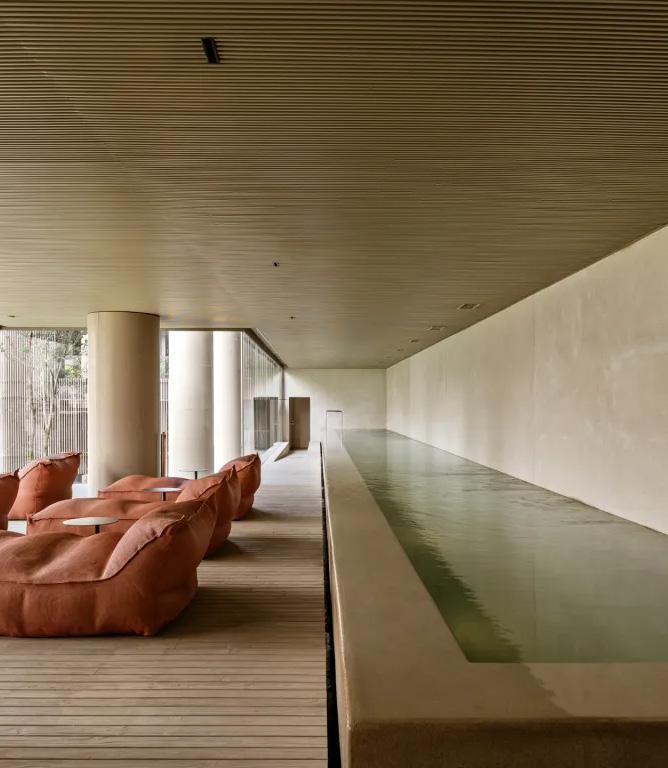
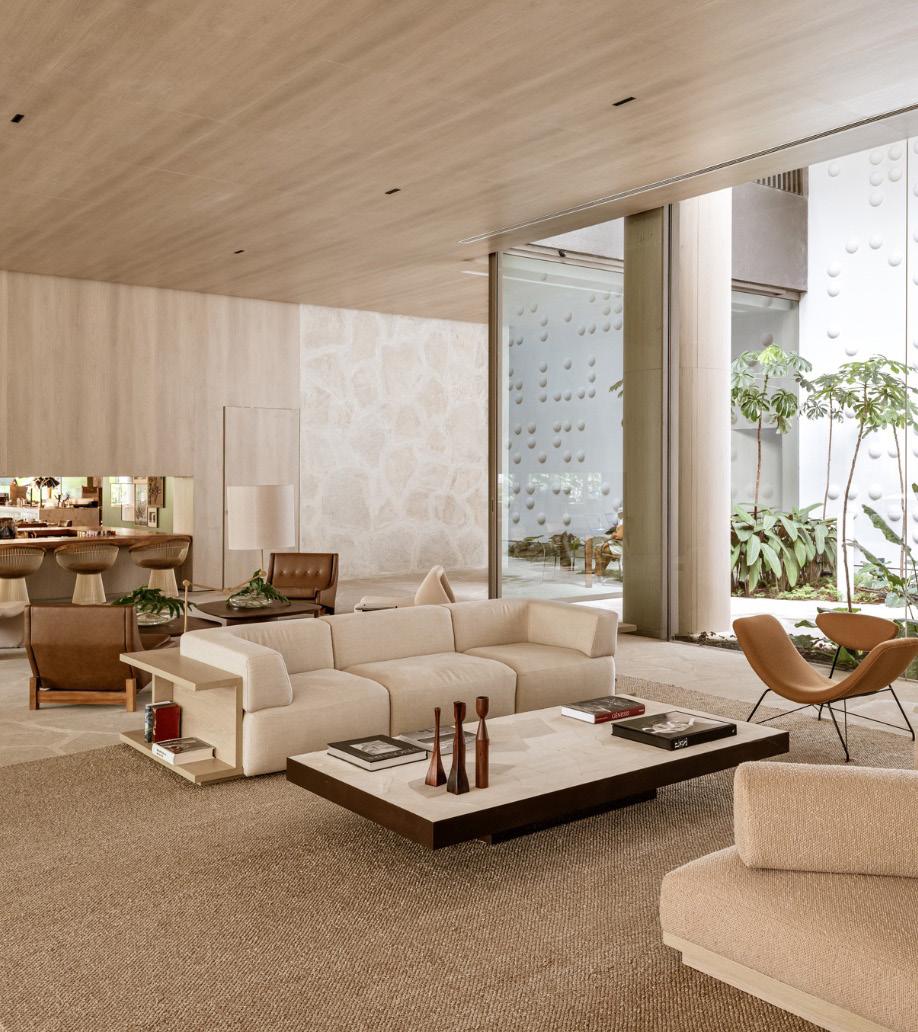
SEEKING A RARE CALM IN THE HEART OF BRAZIL’S LARGEST CITY, WE UNCOVERED BRAZIL'S NEWEST BOUTIQUE HOTEL
Soho House brings its signature farmhouse concept to the Mediterranean, offering a sophisticated alternative to Ibiza's coastal scene
The morning light filters through ancient olive branches as members gather on the sun-dappled terrace, laptops balanced alongside cortados, the gentle hum of conversation mixing with birdsong from the surrounding countryside. This is Soho Farmhouse Ibiza at its most essential – a place where creativity meets tranquillity, where the frenetic energy of the coast gives way to something altogether more contemplative.
Located in the picturesque village of Santa Gertrudis, deep in the island's verdant interior, Soho House's latest venture represents a bold departure from the typical Ibiza narrative. While the coastline pulses with beach clubs and yacht parties, this nineacre retreat embraces a different rhythm entirely –one that celebrates the island's agricultural heritage and its reputation as a creative sanctuary.
The property marks several firsts for Soho House: the brand's inaugural venture into the Balearic Islands, its first Mediterranean farmhouse, and its first year-round operation in a destination traditionally viewed as seasonal.
The brand's expansion reflects a deeper understanding of Ibiza's transformation from seasonal party destination to year-round creative hub, attracting artists, writers, designers, and entrepreneurs who have made the island their permanent home.
The farmhouse concept, pioneered at the original Soho Farmhouse in Oxfordshire, translates beautifully to the Mediterranean context. Where the English countryside offers rolling hills and meadows, Ibiza provides ancient olive groves and dramatic limestone landscapes. The architecture honours traditional Ibizan fincas with their distinctive thick white walls and flat roofs, while incorporating the relaxed luxury that defines the Soho House experience.
The design philosophy centres on "authentic integration" – respecting the island's cultural heritage while meeting the needs of contemporary creative professionals. The property's 18 bedrooms, including several standalone villas, eschew the minimalist white aesthetic often associated with Ibiza hotels in favour of warmer, more textured interiors that celebrate local craftsmanship.
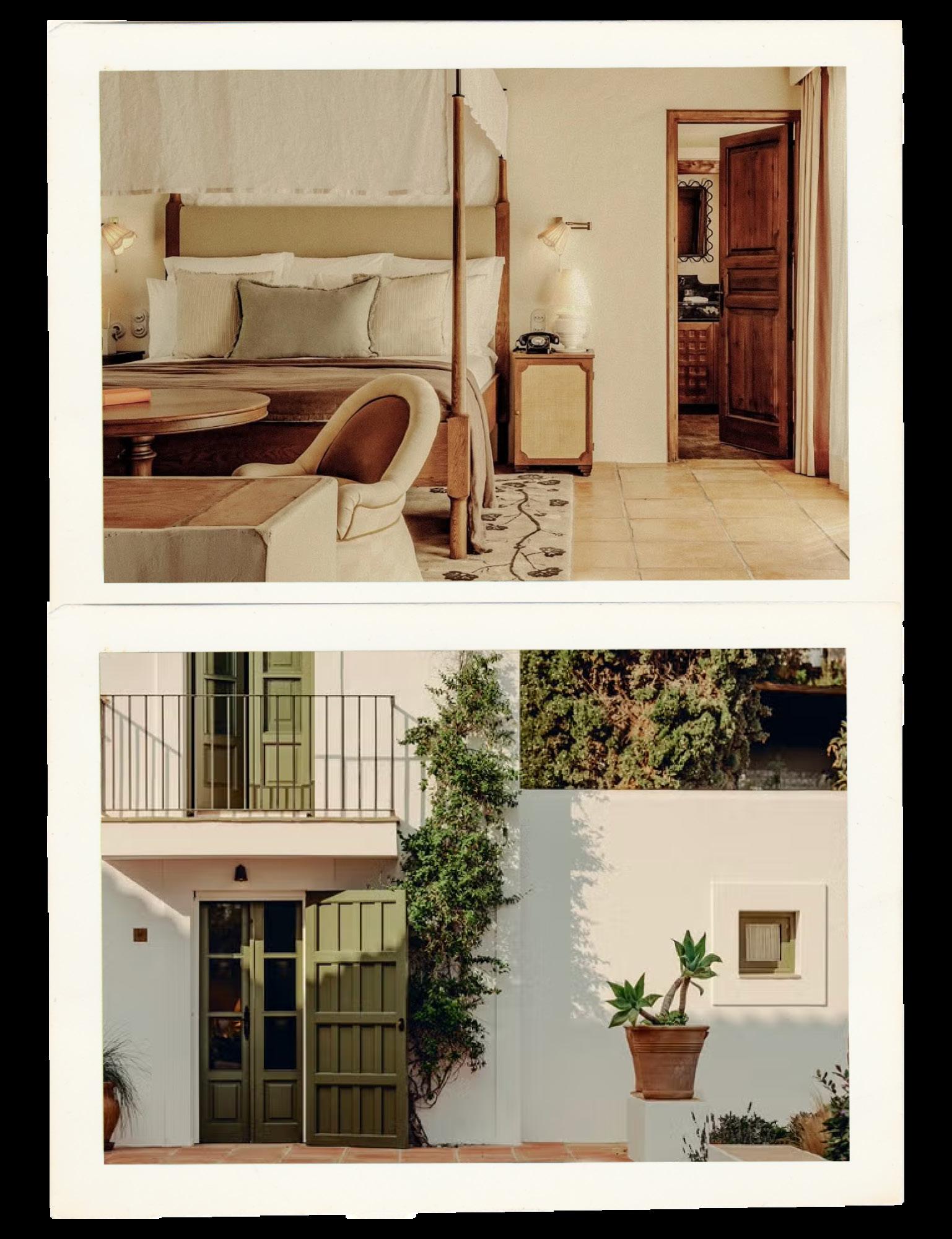
Each accommodation tells a story of place through carefully curated details: locally woven textiles, ceramics from island artisans, and furniture crafted from reclaimed wood sourced from traditional Ibizan boats. The standalone villas appeal particularly to members seeking extended stays, with private terraces overlooking the olive groves and dedicated workspace areas.
The central club building serves as the property's beating heart, designed to facilitate the organic interactions that define the Soho House experience. The main lounge embraces the indoor-outdoor living that characterises Mediterranean life, with oversized doors that disappear completely, creating seamless flow between interior and exterior spaces.
The dining programme reflects the property's commitment to showcasing the island's culinary heritage while maintaining elevated standards.
The kitchen focuses on working with local farmers and fishermen to source the best ingredients the island offers, presenting them in ways that honour tradition while appealing to international palates. The on-site kitchen garden produces an impressive array of Mediterranean herbs, vegetables, and fruits that change with the seasons. The property's commitment to local




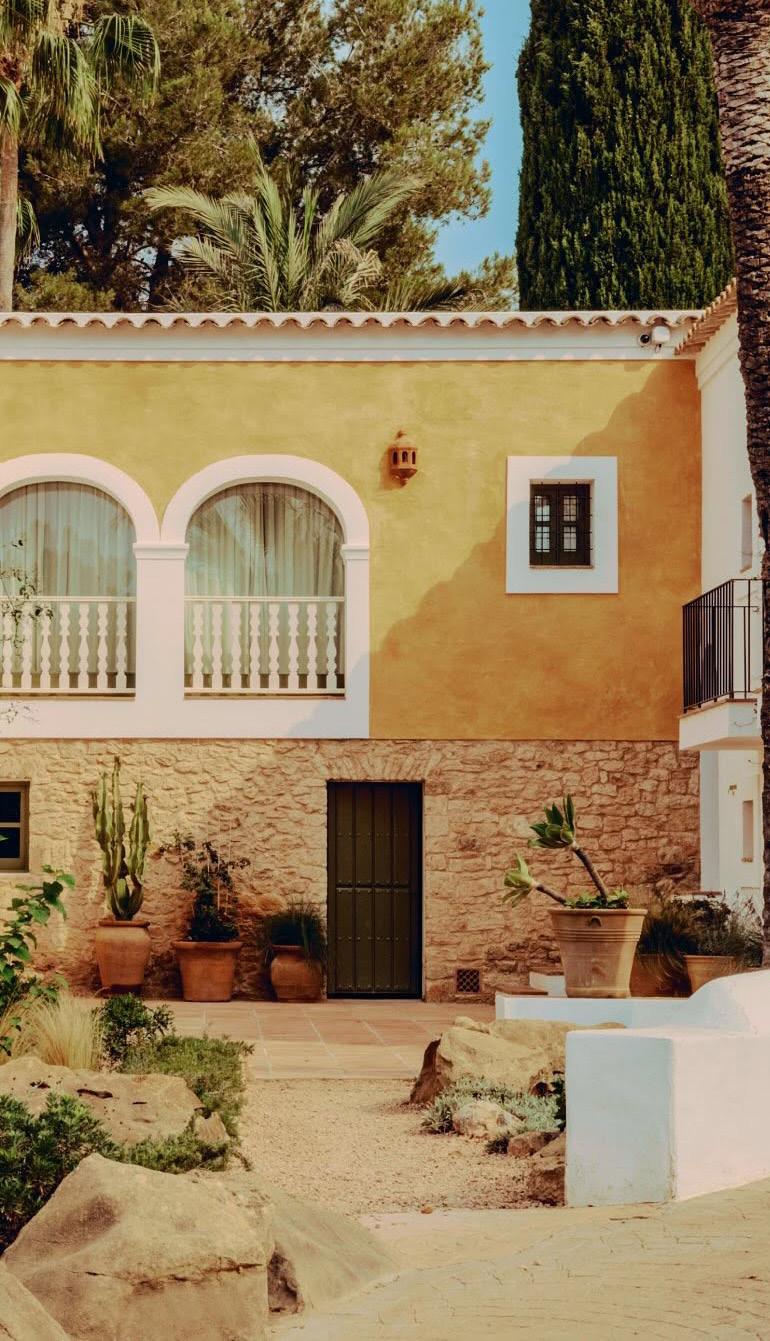

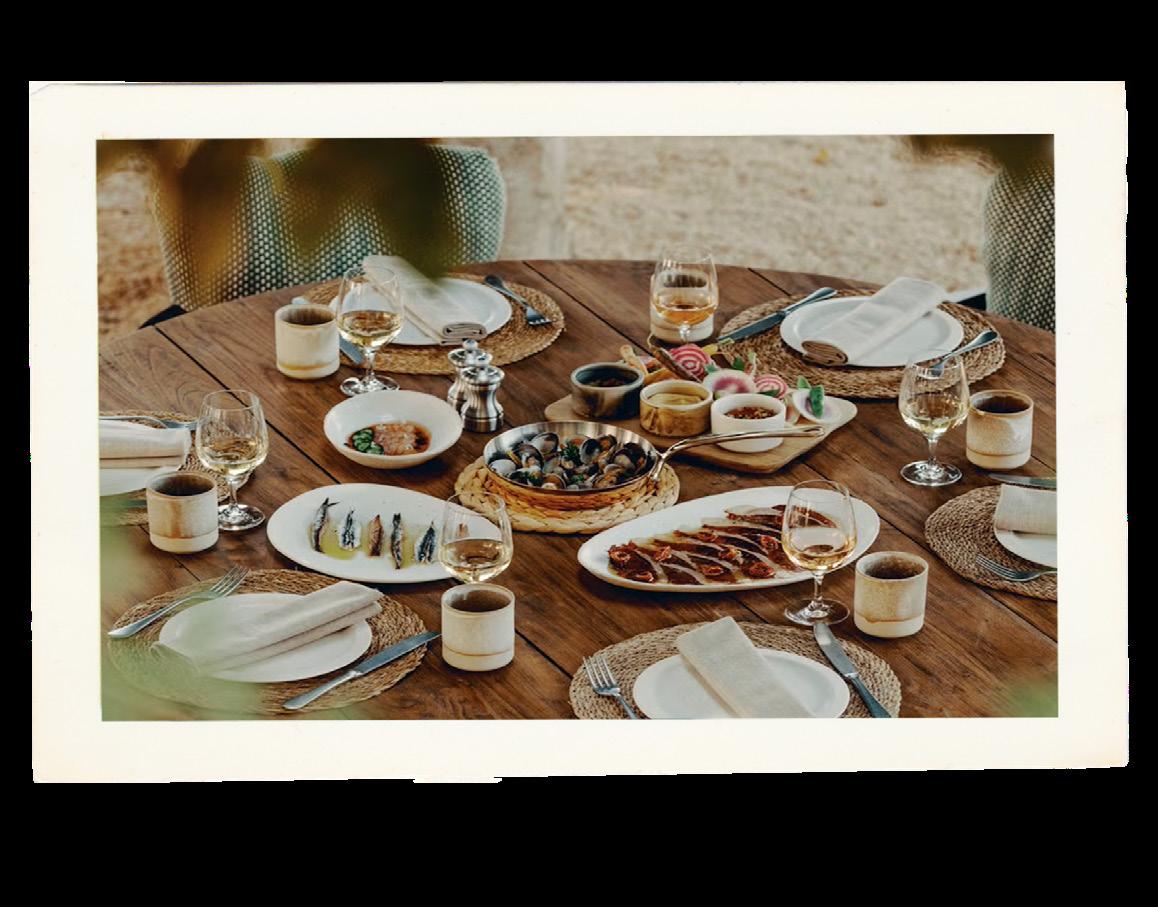
sourcing extends to partnerships with island producers – olive oil comes from groves within walking distance, cheese arrives from family farms in the interior, and fish is delivered daily from traditional fishing villages.


The Soho Health Club recognises wellness as central to Mediterranean culture, where outdoor living and nature's restorative power form daily life. The open-air yoga deck, positioned to capture sunrise over the olive groves, hosts daily sessions adapted to the island's natural rhythms. The thermal experience suite features sauna and steam room utilising locally sourced materials, while ice baths provide refreshing contrast therapy.
The property's central location in Santa Gertrudis provides easy access to the village's growing community of galleries, boutiques, and restaurants. Beyond providing accommodation and amenities, Soho Farmhouse Ibiza positions itself as a platform for cultural exchange and creative development. The property hosts regular exhibitions featuring work by island-based artists, while visiting artist programmes bring international creatives for residencies that result in new works inspired by the Mediterranean landscape. Music programming reflects both Ibiza's reputation as a global music destination and the farmhouse's more contemplative atmosphere. Intimate acoustic sessions take place in the main lounge during winter evenings, while outdoor performances utilise

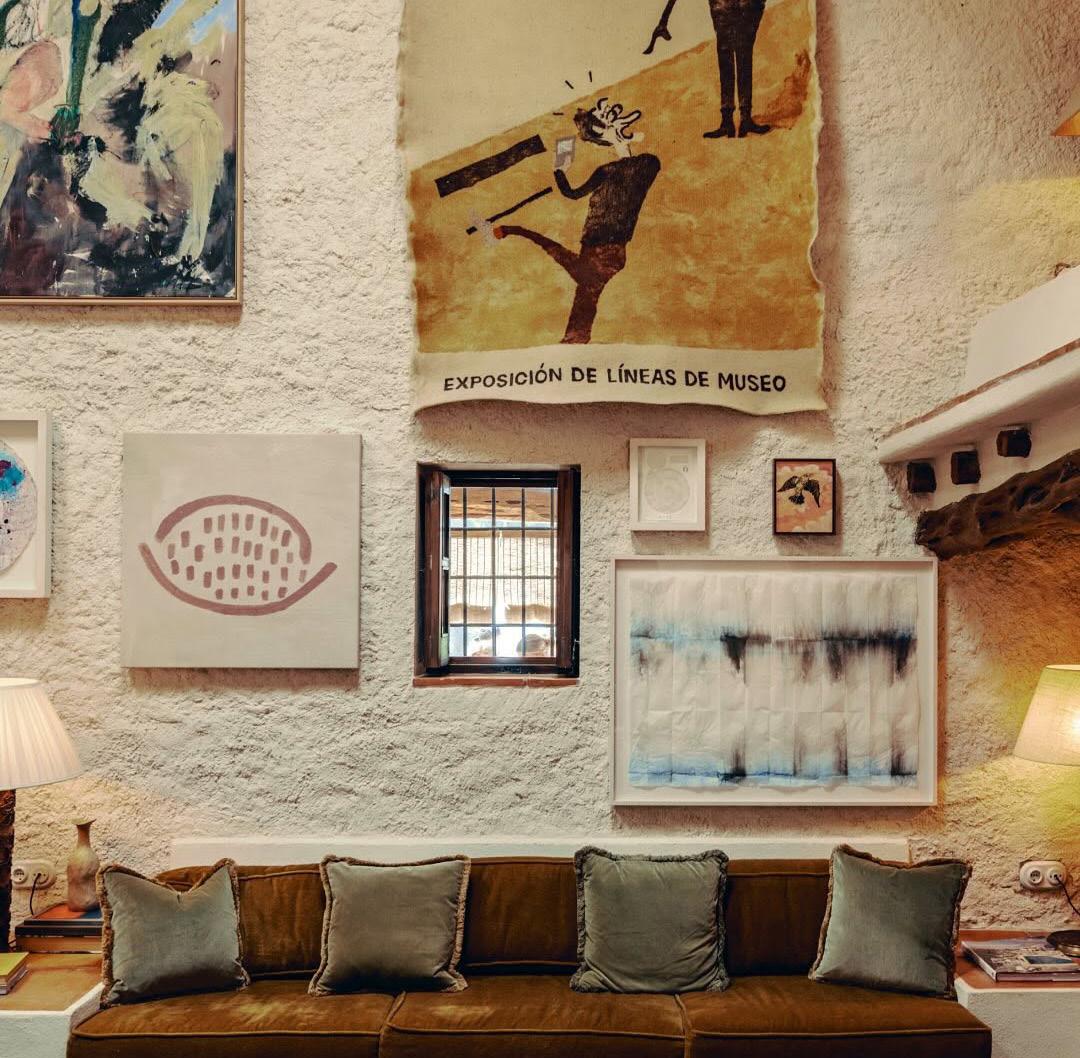
the natural amphitheatre created by the olive grove terraces.
The property's sustainability approach extends beyond environmental initiatives to embrace practices suited to the Mediterranean context. The property operates its own water treatment system, while solar panels and geothermal systems reduce dependence on external energy sources. The working olive grove maintains the land's agricultural heritage.
Soho Farmhouse Ibiza signals an evolution in how luxury hospitality can engage with destination culture while serving contemporary travellers' needs. The farmhouse concept, adapted for the Mediterranean context, suggests possibilities for sustainable luxury that honours local heritage while providing contemporary amenities. The integration of agricultural elements – from the working olive grove to the kitchen garden – creates authentic connections to place that extend beyond superficial design references.
For members, both visiting and local, Soho Farmhouse Ibiza provides a place where the pace naturally slows, where genuine connection – to place, to others, to creative practice – becomes possible. The property offers respite from urban life within Ibiza's tranquil interior. sohohouse.com




The story of Lacoste begins not in a boardroom or fashion studio, but on the clay courts of 1920s tennis tournaments, where a determined young Frenchman earned himself a legendary nickname. Today, that sporting heritage finds new expression at the Lacoste Monaco cafe, the brand's first hospitality venture that opened at Le Méridien Beach Plaza this summer. René Lacoste revolutionised tennis in more ways than one. Nicknamed "the Crocodile" because of his tenacity on court, he introduced the revolutionary tennis shirt in 1929 and founded the brand with its iconic logo in 1933. As one of the Four Musketeers alongside Jean Borotra, Jacques Brugnon, and Henri Cochet, French players who dominated tennis in the late 1920s and early 1930s, Lacoste's influence extended far beyond his seven Grand Slam singles titles. The crocodile logo itself was born from athletic ambition and American journalism. In Boston, 1923, young tennis prodigy René was promised a crocodile leather suitcase by his team captain if he won an upcoming match. René didn't win but he had the determination of a crocodile on court, which earned him the nickname from American press. The crocodile design emerged
in 1927 under the pen of designer Robert George, with René immediately having it embroidered on his blazers.

Before the crocodile invaded tennis courts, long-sleeved cotton shirts were the norm. The Lacoste polo was revolutionary - short sleeves optimised mobility while the innovative "petit piqué" material allowed players to sweat less. This established Lacoste as the first brand to display a visible logo on clothing, fundamentally changing sportswear forever. René's inventive spirit extended beyond apparel. In 1961, he patented the first tubular steel tennis racket, which would later become famous as the Wilson T-2000 used by tennis greats including Billie Jean King and Jimmy Connors. His innovations consistently challenged conventional tennis equipment and attire.
The brand's connection to tennis excellence continues today, with Novak Djokovic serving as brand ambassador and dubbed "the new crocodile," ensuring the sporting legacy remains central to the brand's identity.
Ninety years after René founded his company, Lacoste has ventured into hospitality with its Monaco cafe at Le Méridien Beach Plaza. The partnership with Monaco-based Riccardo Giraudi creates a dining concept rooted in the brand's sportinspired heritage. Located at the eastern end of Larvotto, the

venue operates daily from 9am to 2am, with expansion also planned for Paris.
The Monaco location makes perfect sense given the principality's sporting pedigree. Giraudi, a prominent figure in Monaco's gastronomic scene, designed the culinary concept celebrating both French bistronomy and tennis heritage. Coquillettes and baguette dishes are served alongside clubs with tennis-inspired names like "The Practice," while desserts come in Single or Double portions - a playful nod to tennis scoring. The venue features a giant crocodile across the main wall, with smaller motifs appearing on pillows and details throughout.
The cafe marks Lacoste's first hospitality venture, reflecting broader luxury brand evolution where today's consumers seek experiences that reflect their values and aesthetics. While initially planned through 2026, significant investment suggests longer-term ambitions, with Paris already confirmed as the next location.
From a determined tennis player's nickname to global fashion empire, and now to Monaco's dining scene, Lacoste continues to serve up innovation that honours its sporting heritage while embracing modern culture. @lacoste
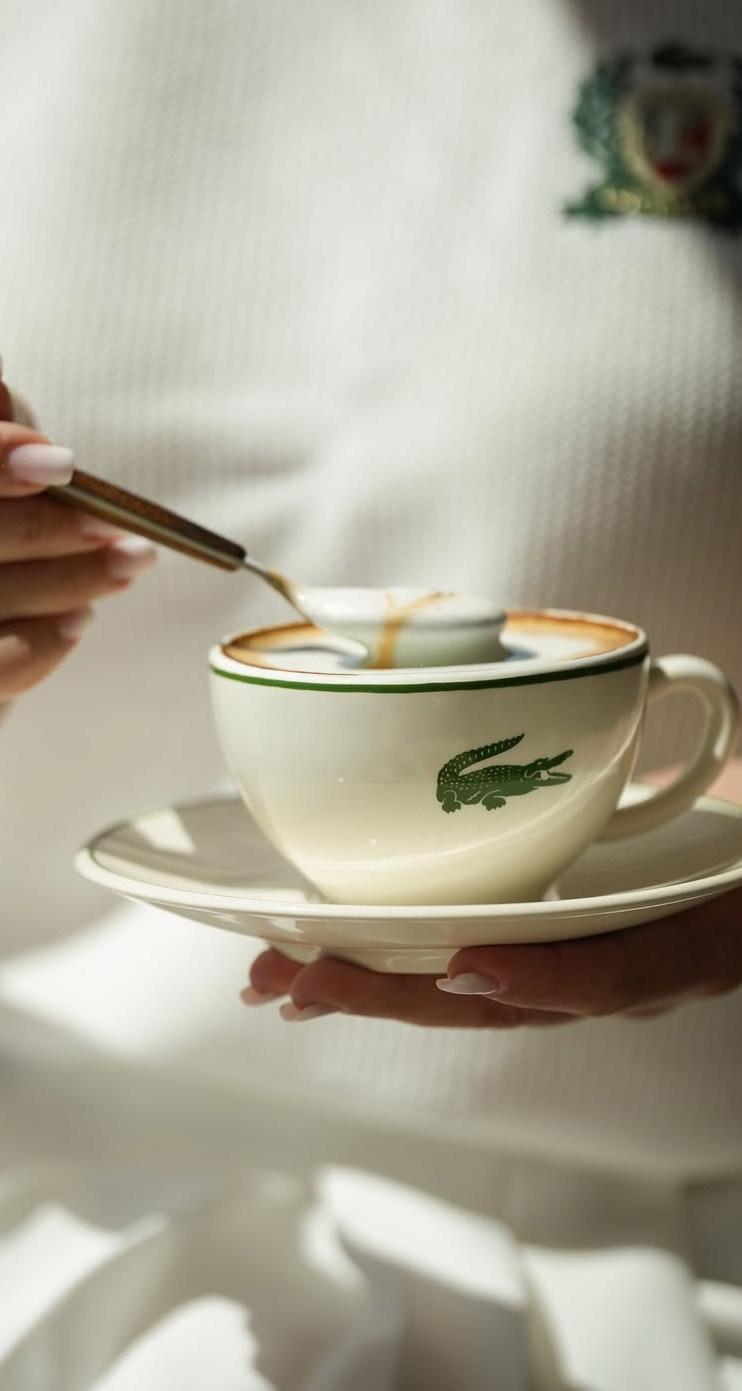
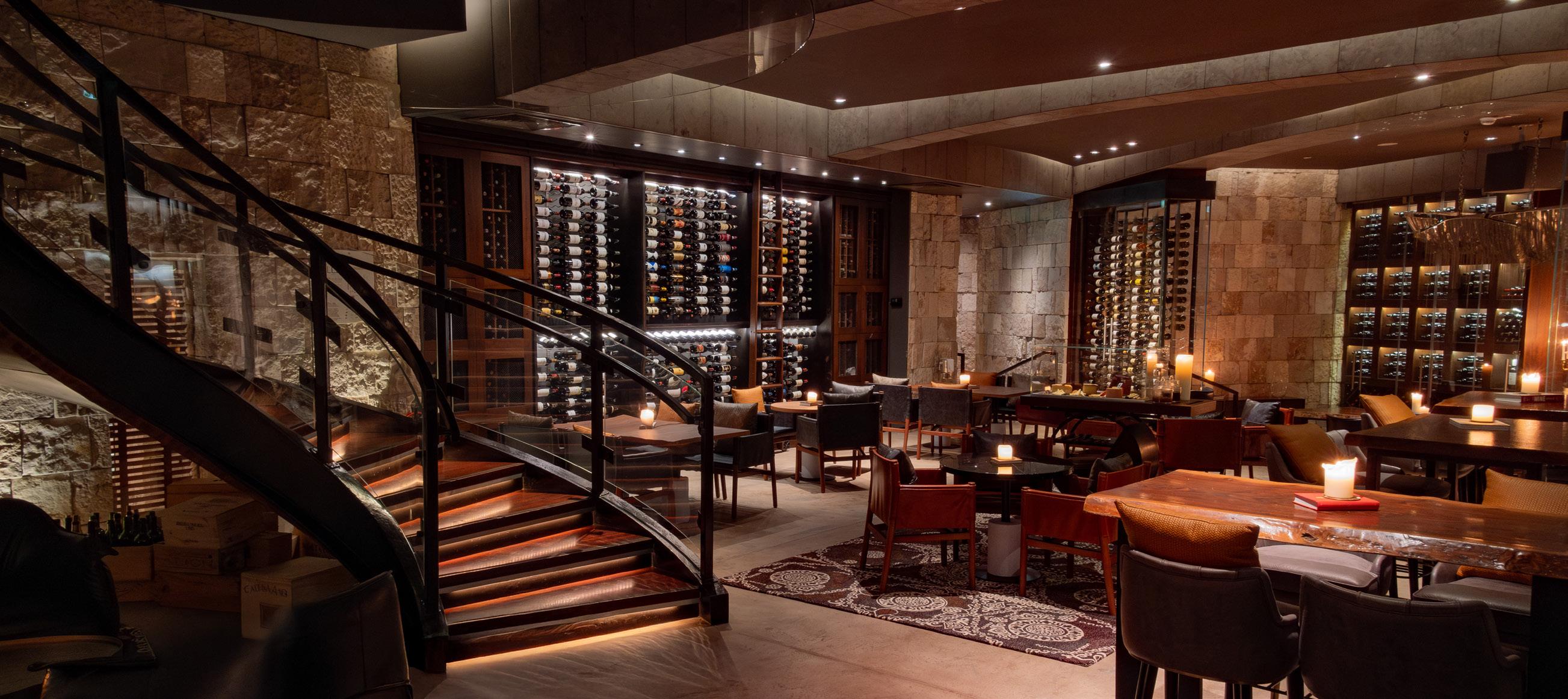
After dining at so many restaurants across the UAE, it’s rare to come across a place that truly surprises you. I had a dinner booked at La Cava, a venue I hadn’t heard of before but soon discovered it has a reputation for its wine selection.
The restaurant itself is intimate and atmospheric, with dim lighting, candlelit tables, and a classic, almost old-world charm.
The room is quiet, with only a few tables spaced generously apart, giving the space a sense of privacy and calm.
I was immediately impressed by the sheer scale of the wine list, with bottles displayed.
The first starter, Three-Way Tomato, was a standout. A base of charred sourdough was topped with three preparations of tomato, each bringing its own texture and flavour. It was generously dressed with rich olive oil, resulting in a deeply satisfying first bite.
Next came the Scallop Tiradito, featuring Hokkaido scallop in a vibrant leche de tigre amarillo, garnished with pomelo and crisp corn tortilla chips. Bright, citrusy
and delicately balanced, it was a highlight of the evening.
The Patatas Bravas, while not traditional, were presented in a churro-style shape. This reinterpretation wasn’t quite to my taste, but it was an interesting twist nonetheless, while the Calamares Fritos –Patagonian calamari in a light tempura with squid ink aioli –offered a crunchy, well-seasoned, and satisfying dish.
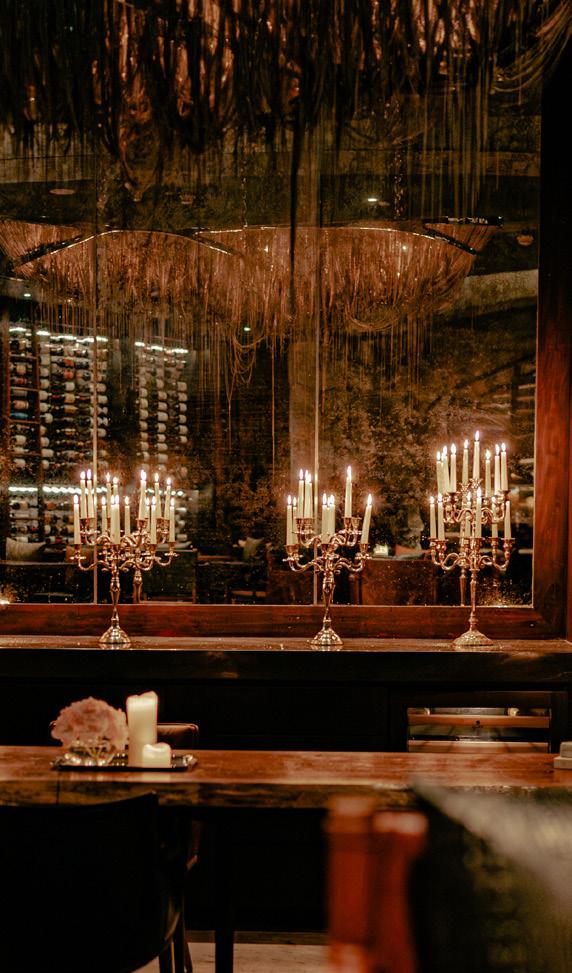
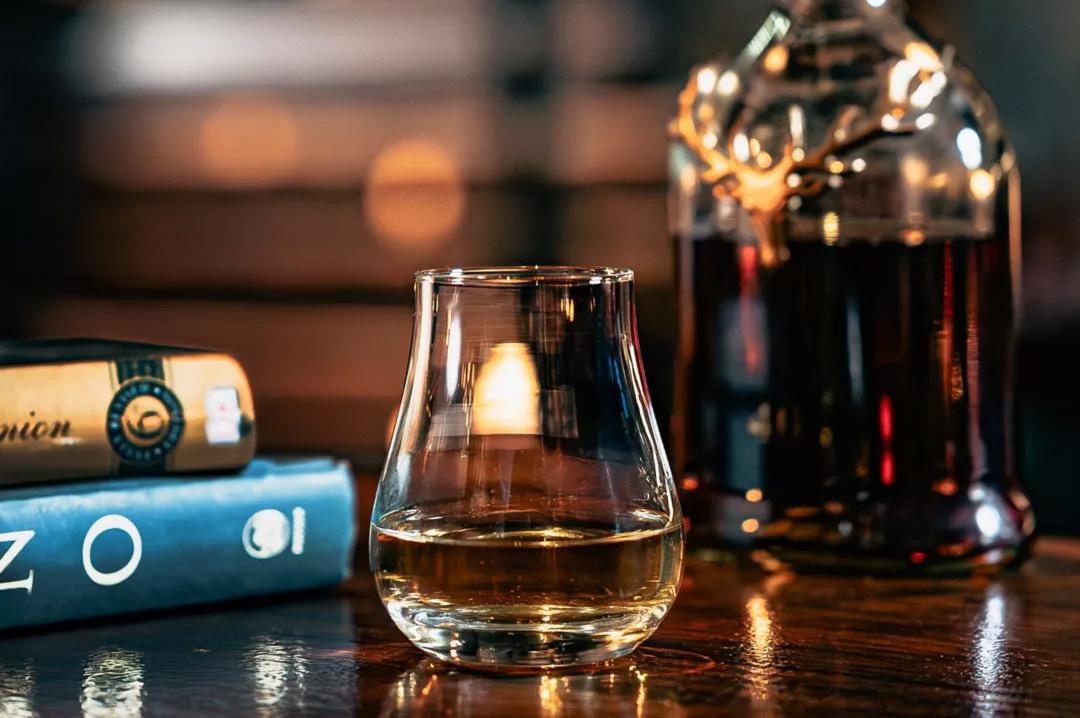
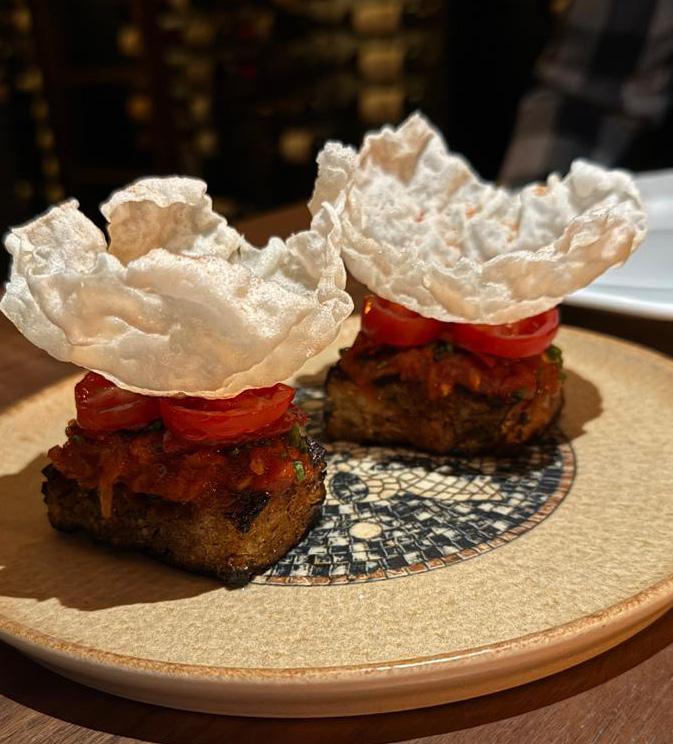
For the main course, we shared the Chuletón El Capricho – José Gordón Selection, a dry-aged ox loin steak which was deeply flavourful, with a pronounced beefiness and subtle nutty notes from the dry-ageing.
To end the meal, there was only one dessert on the menu: Basque Cheesecake. But honestly, nothing else was needed. It was served with
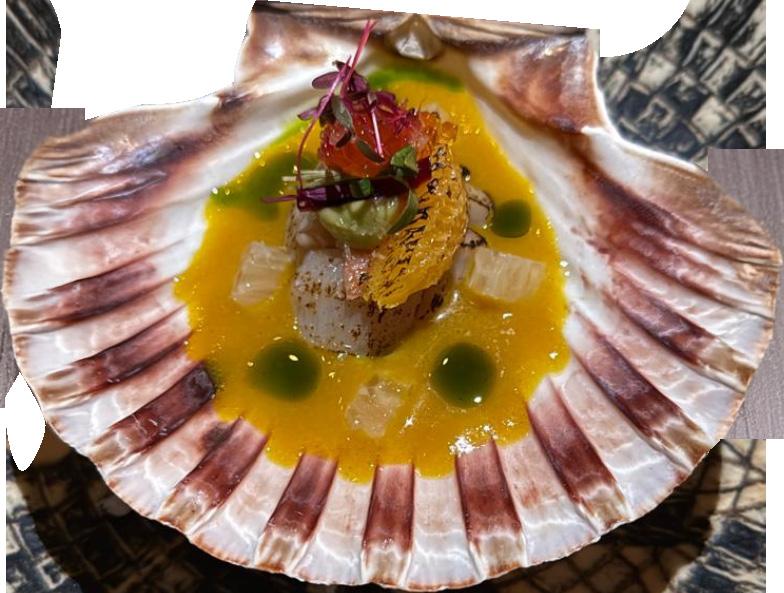
a reduced cherry sauce and a scoop of vanilla ice cream. The cheesecake was perfectly baked, with a soft, creamy centre and slightly caramelised edges.
La Cava stands out in Abu Dhabi’s ever-growing restaurant scene not for making the most noise, but for quietly exceeding expectations. The unassuming menu pulls out all the stops and gets top marks for its superb simplicity. For vinophiles, it’s an excellent choice, but if you’re coming only for a tasting we recommend sticking around for the food. rosewoodhotels.com

The arrival of China Tang Dubai at The Lana Promenade adds another layer to Dubai's evergrowing dining scene. This Middle East debut of London's celebrated Cantonese restaurant brings the late Sir David Tang's vision to Business Bay. Walking into China Tang Dubai feels like entering 1930s Shanghai, with chinoiserie accents and custom stained glass creating an atmosphere of oldworld glamour. The restaurant's unique feature – a custom-built duck oven room visible upon entry – immediately signals the theatrical approach to dining that defines the experience.
The menu, overseen by chef Li Zhenjun with his 25 years of Cantonese fine dining experience, delivers on both tradition and innovation. The restaurant's signature Beijing duck can be glimpsed being prepared in the prominent oven room, available
for those willing to wait 45-60 minutes for tableside carving.
China Tang Dubai introduces several exclusive creations alongside the London favourites. The black cod with chili broth demonstrates the kitchen's understanding of balance, with delicate fish complemented by a warming, aromatic broth.
The wagyu beef in stone pot arrives dramatically at the table, the sizzling presentation as impressive as the tender, perfectly cooked meat within.
The dim sum selection spans over 30 varieties, each demonstrating careful attention to texture and flavour balance.
The golden shrimp har kau showcases the kitchen's technical skill with translucent wrappers that reveal plump prawns within.
The wagyu beef tart, presented in a pastéis de nata-style pastry, offers an unexpected fusion of Portuguese technique with premium beef filling. The crispy prawn cheung fan delivers textural contrast with its silky rice noodle exterior and crunchy prawn centre.

The two-floor space offers thoughtful design that includes mirrored ceilings and ambient lighting reflecting Chinese yin and yang philosophy. The cocktail bar serves inventive drinks designed to complement the cuisine, though the wine selection could benefit from more diverse options beyond the extensive collection.
Service meets the hospitality standards expected from the China Tang name, with staff knowledgeable about both the dishes and their cultural significance.
China Tang Dubai successfully translates London's iconic dining experience to Dubai's cosmopolitan palate. While some dishes reach exceptional heights, others feel slightly restrained compared to their London counterparts. The restaurant fills a notable gap in Dubai's Cantonese fine dining scene, offering both authenticity and the theatrical dining experience that makes meals memorable rather than merely satisfying.
@chinatang_dubai
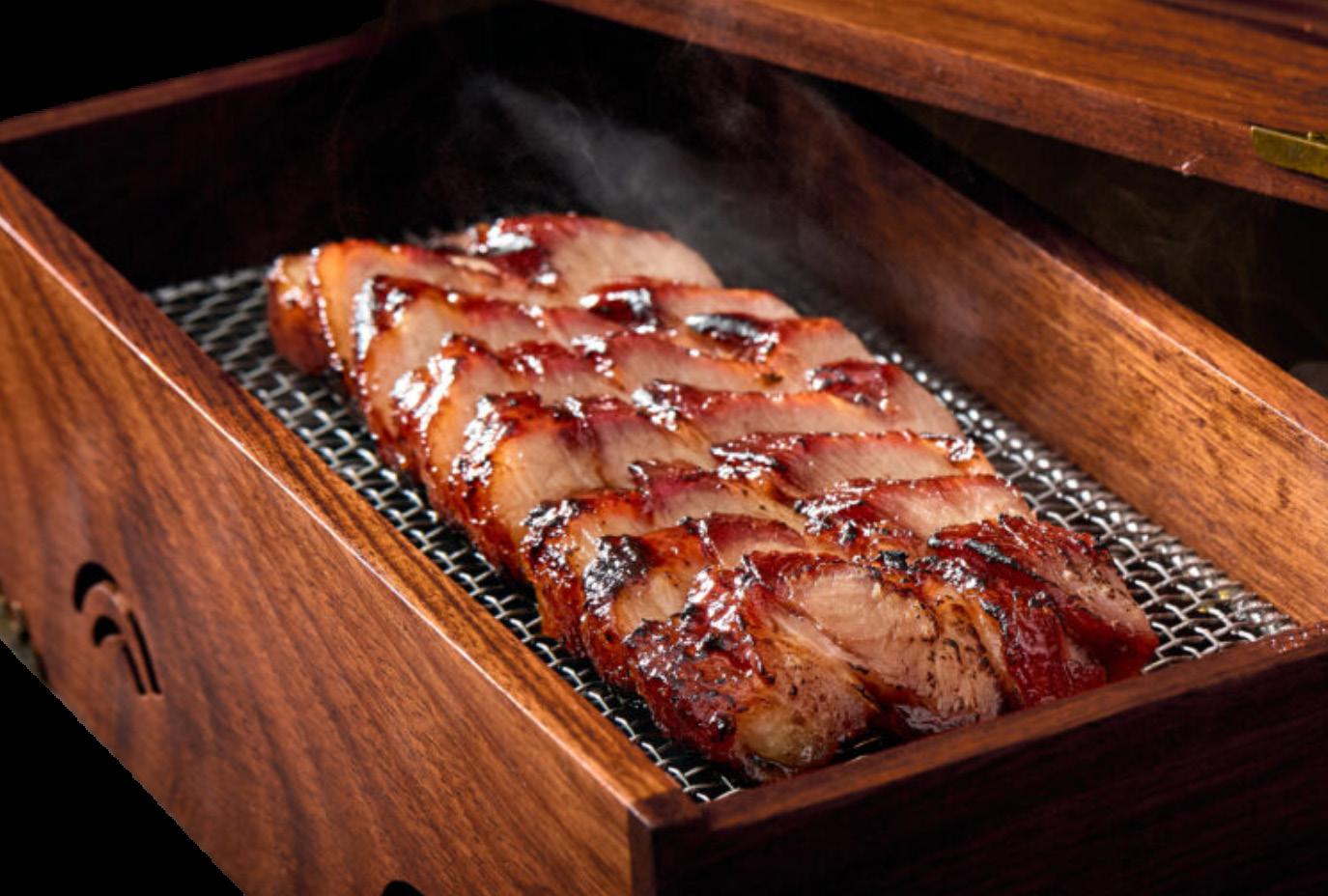
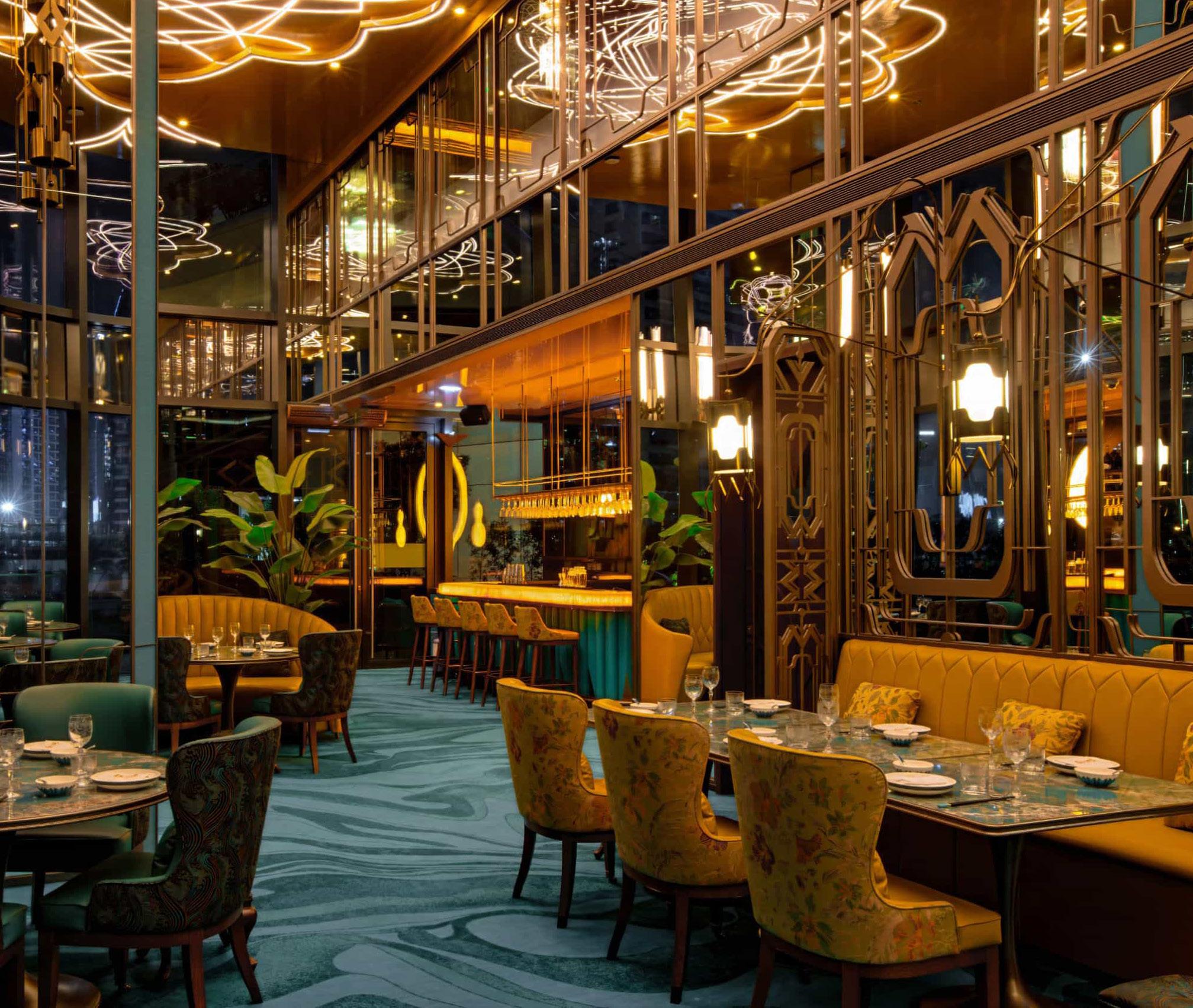

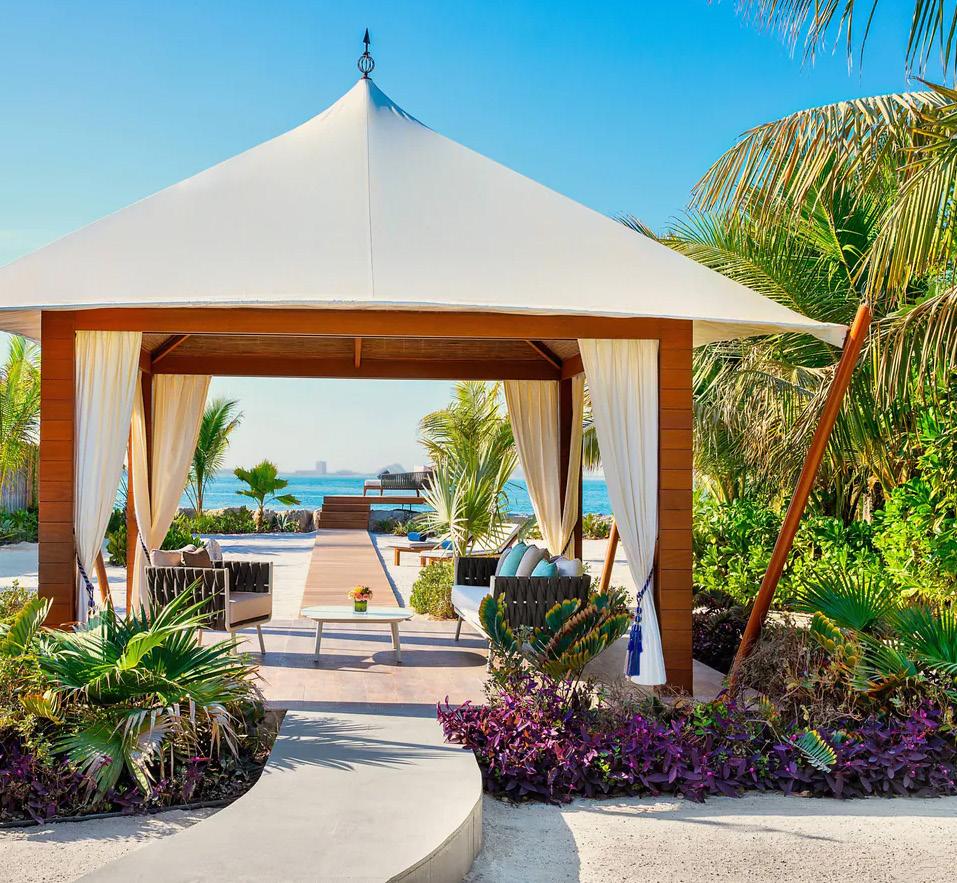
With only 32 villas across the entire property, peaceful is the most accurate word to describe the atmosphere at The Ritz-Carlton Al Hamra Beach. Once you settle into your accommodation, overlooking your private plunge pool from within your own secluded garden, the only disturbance you can expect is the gentle pitter-patter of a gecko climbing the fence. The villa interiors showcase a sophisticated blend of traditional Arabian design and contemporary luxury. The dramatic four-poster bed, draped in flowing white curtains, commands attention beneath soaring bamboolined ceilings that create an authentic yet refined atmosphere. Moroccan-inspired archways frame the sleeping area, while rich navy and cream textiles with geometric patterns add warmth and character throughout. Floor-to-ceiling sliding doors blur the boundaries between indoor and outdoor living, creating a seamless connection to your private terrace and pool area. The private plunge pools deserve special mention. These glasswalled sanctuaries are deep enough to stand fully submerged and wide enough for several breaststrokes, providing muchappreciated relief during hot, humid days. It’s a feature that sets this property apart from
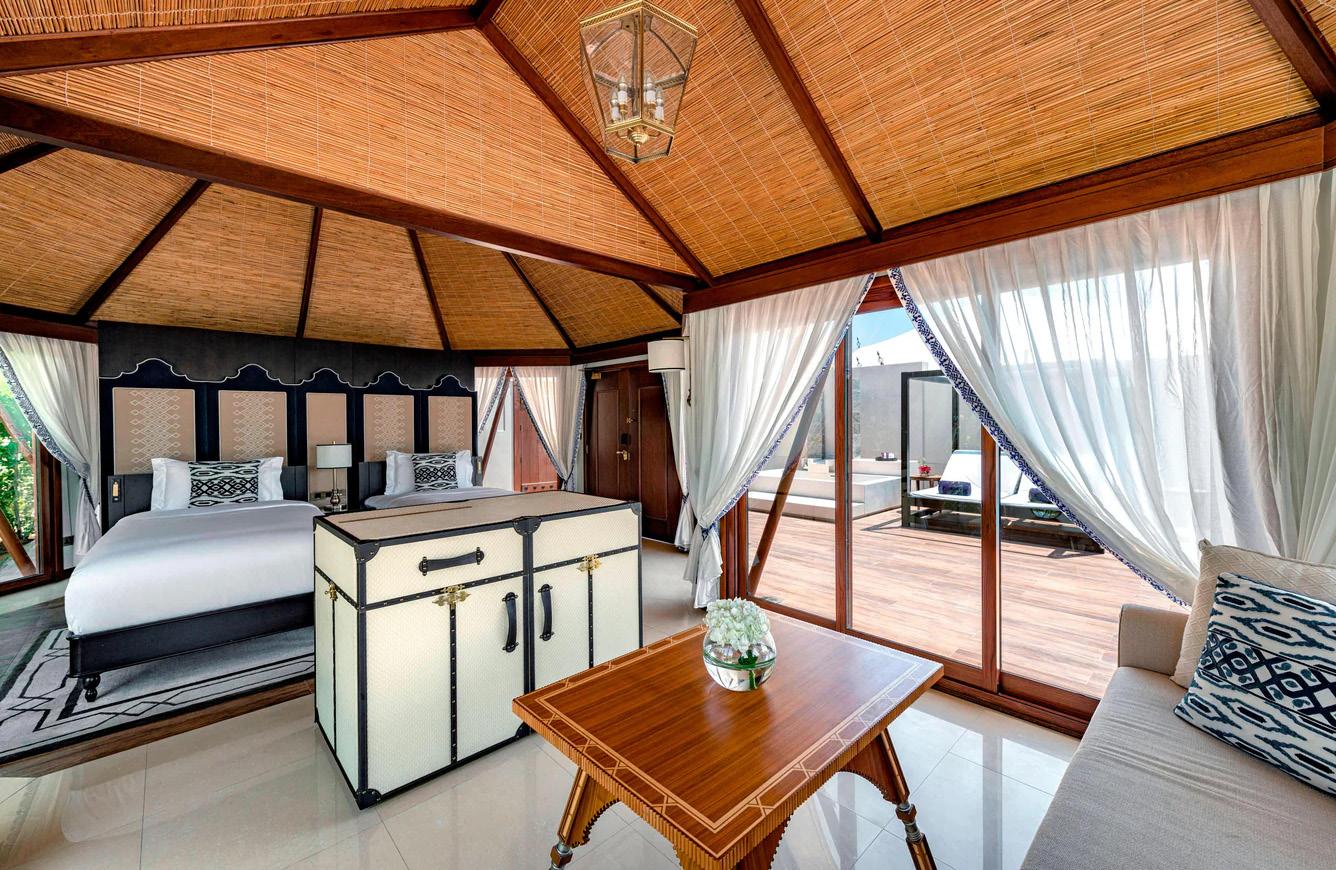
typical hotel pools and adds to the exclusive feel of each villa.
Just an hour’s drive from Dubai,
The Ritz-Carlton Al Hamra Beach offers a staycation experience that makes you forget you didn’t board a plane to reach your destination. The secluded beachfront, particularly appealing for couples seeking privacy, provides ample space for sunbathing or participating in activities such as kayaking and archery.
The resort’s position along Ras Al Khaimah’s coastline offers stunning views and a sense of isolation that’s increasingly rare in the UAE. Whether you’re looking to disconnect completely or simply enjoy a change of scenery, the property delivers on both fronts without requiring the
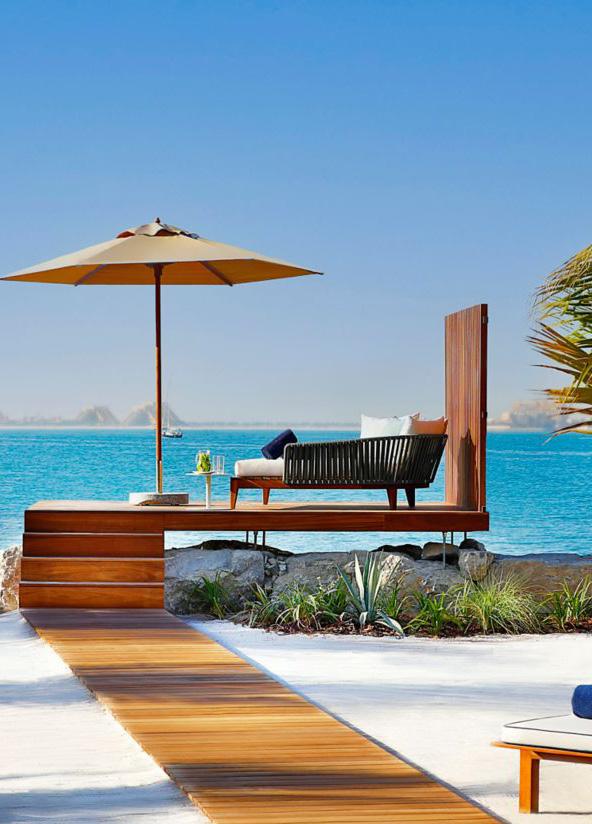
logistics of international travel.
The property’s restaurant, Shore House, serves as the venue for both dinner and breakfast. While the setting might not compete for atmospheric awards, the culinary offerings are impressively sophisticated. Starters arrive beautifully presented and packed with flavour, while the steak, which we apprehensively specified to be medium-rare, arrived perfectly cooked and delightfully juicy.
The resort’s facilities complement rather than compete with the villa-centric experience, understanding that guests have chosen this property specifically for its intimate scale and private amenities. For those preferring complete privacy, in-villa dining is available, allowing you to enjoy meals on your terrace without leaving your secluded sanctuary.
As the area continues developing and Ras Al Khaimah expands its appeal to regional and international visitors, The Ritz-Carlton Al Hamra Beach appears well-positioned to remain a popular choice. For those seeking a tropical escape within the UAE’s borders, the property offers exactly what’s promised: genuine tranquillity and luxury accommodation without the complications of lengthy international travel.
ritzcarlton.com
The dramatic four-poster bed, draped in flowing white curtains, commands attention
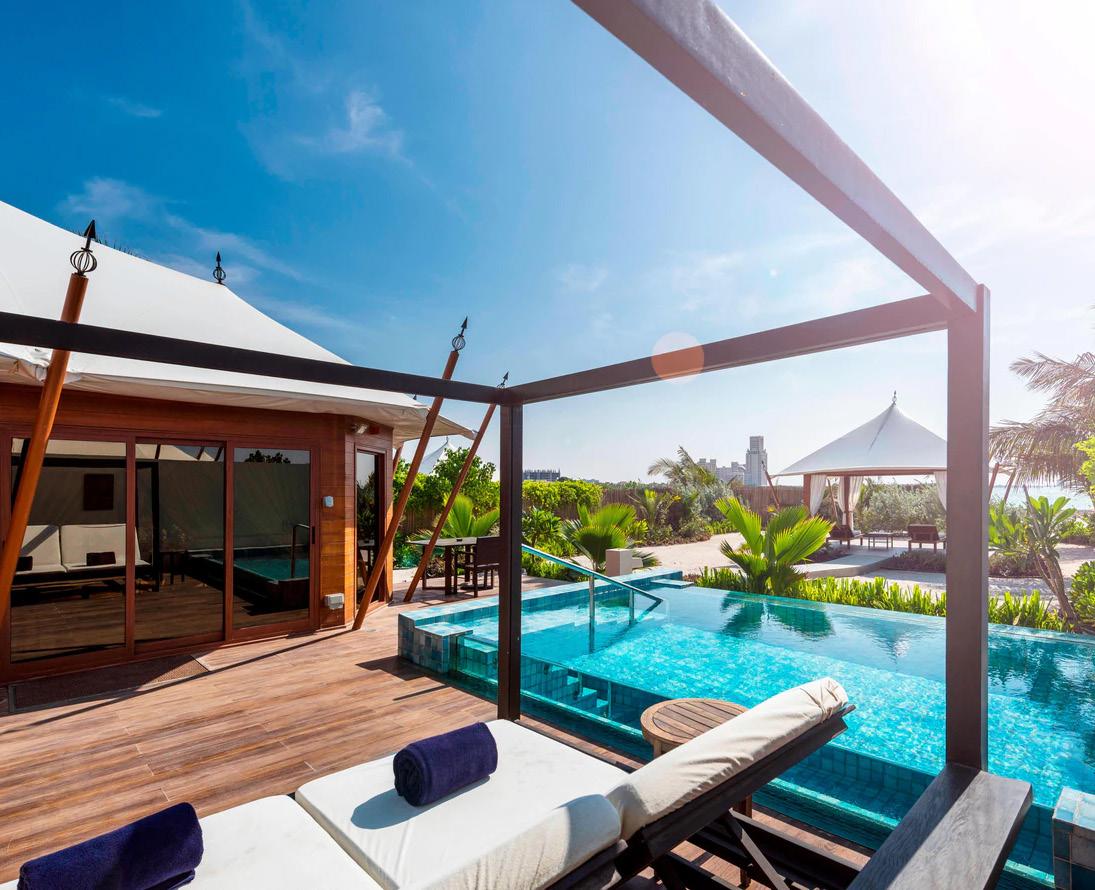
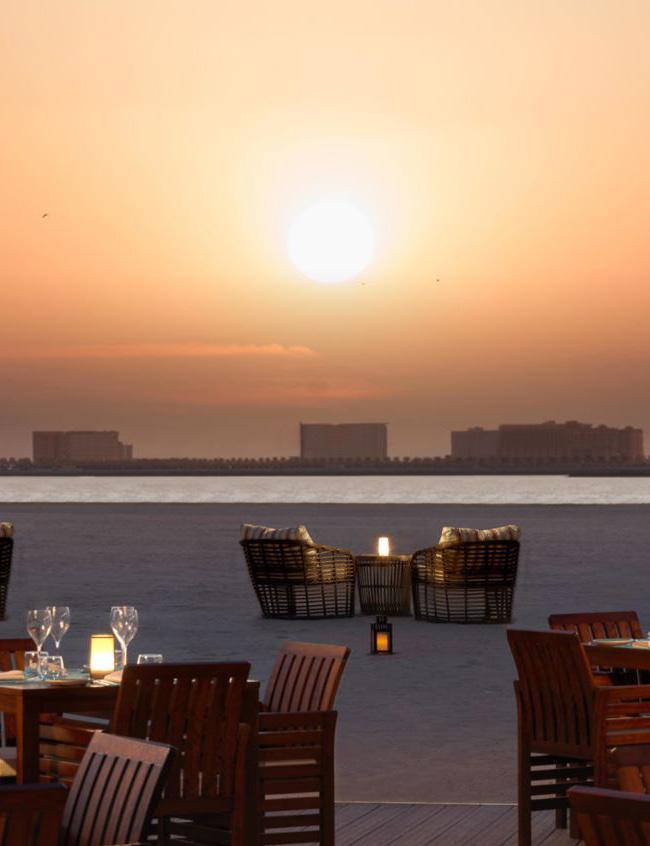
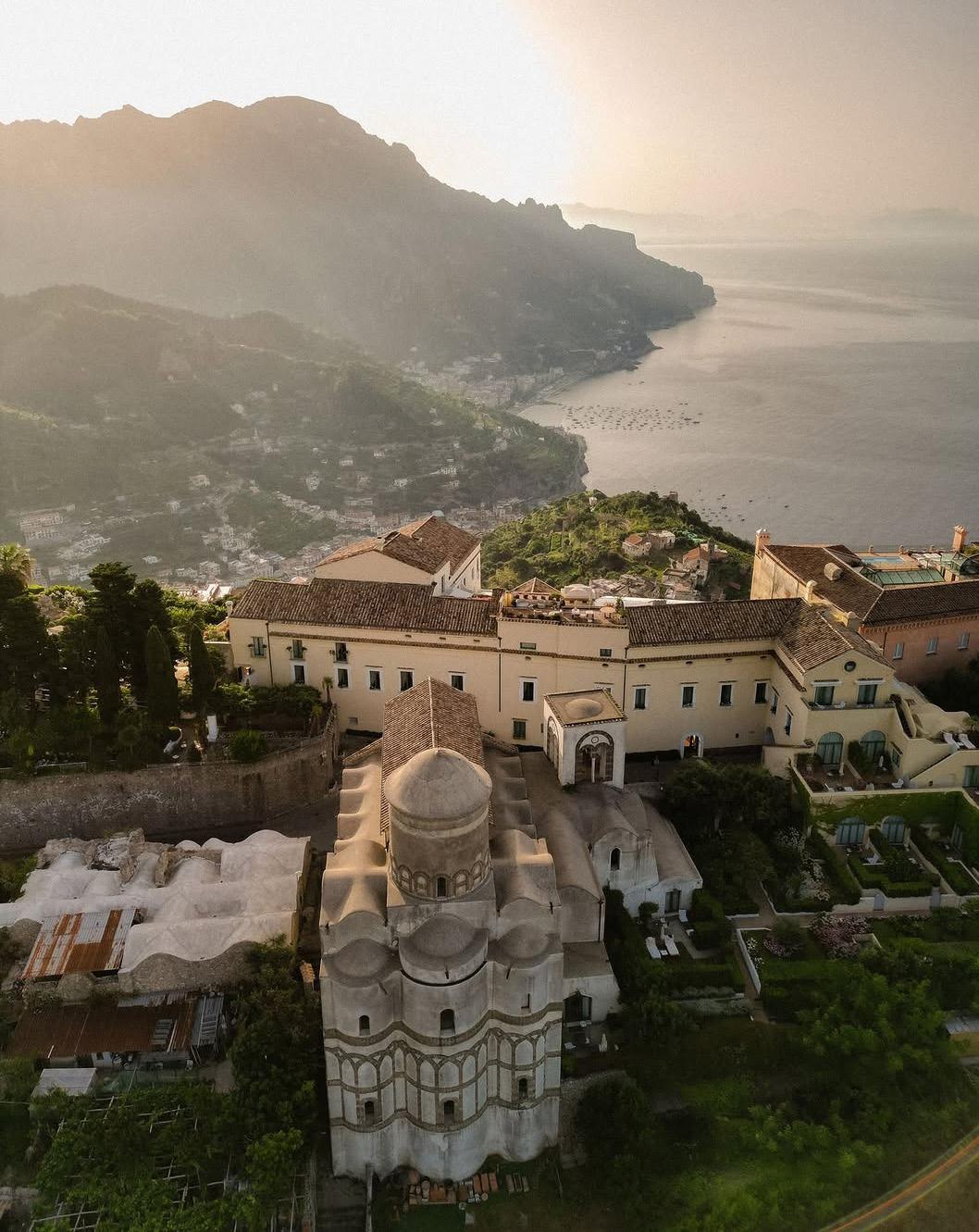
This five-star sanctuary represents the finest in contemporary Italian hospitality, built into ancient rock faces 90 metres above the Mediterranean Sea between Amalfi and Positano. The hotel features 52 rooms and suites, each offering unobstructed sea views and access to the coast's only private sandy beach. The property's crown jewel is Alici, the Michelin-starred restaurant helmed by Chef Crescenzo Scotti, which serves elevated regional cuisine on a panoramic terrace. @borgosantandreaamalfi
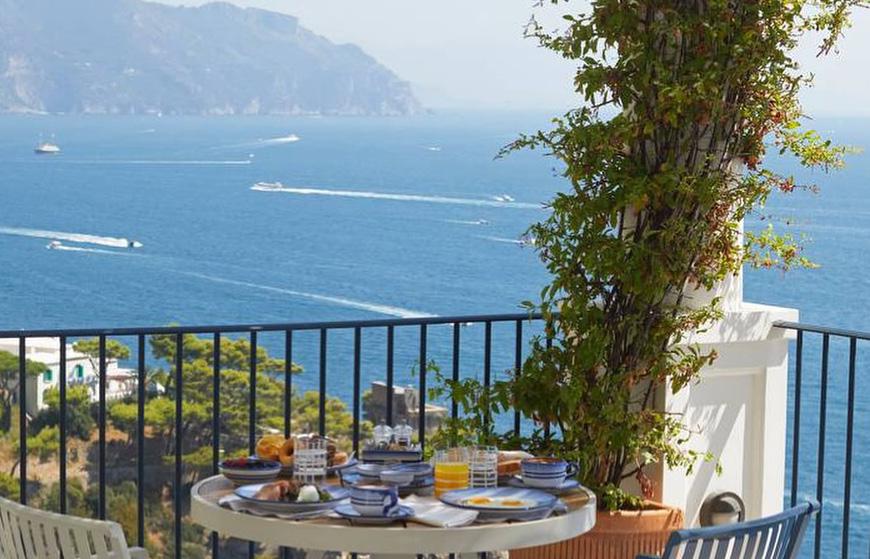
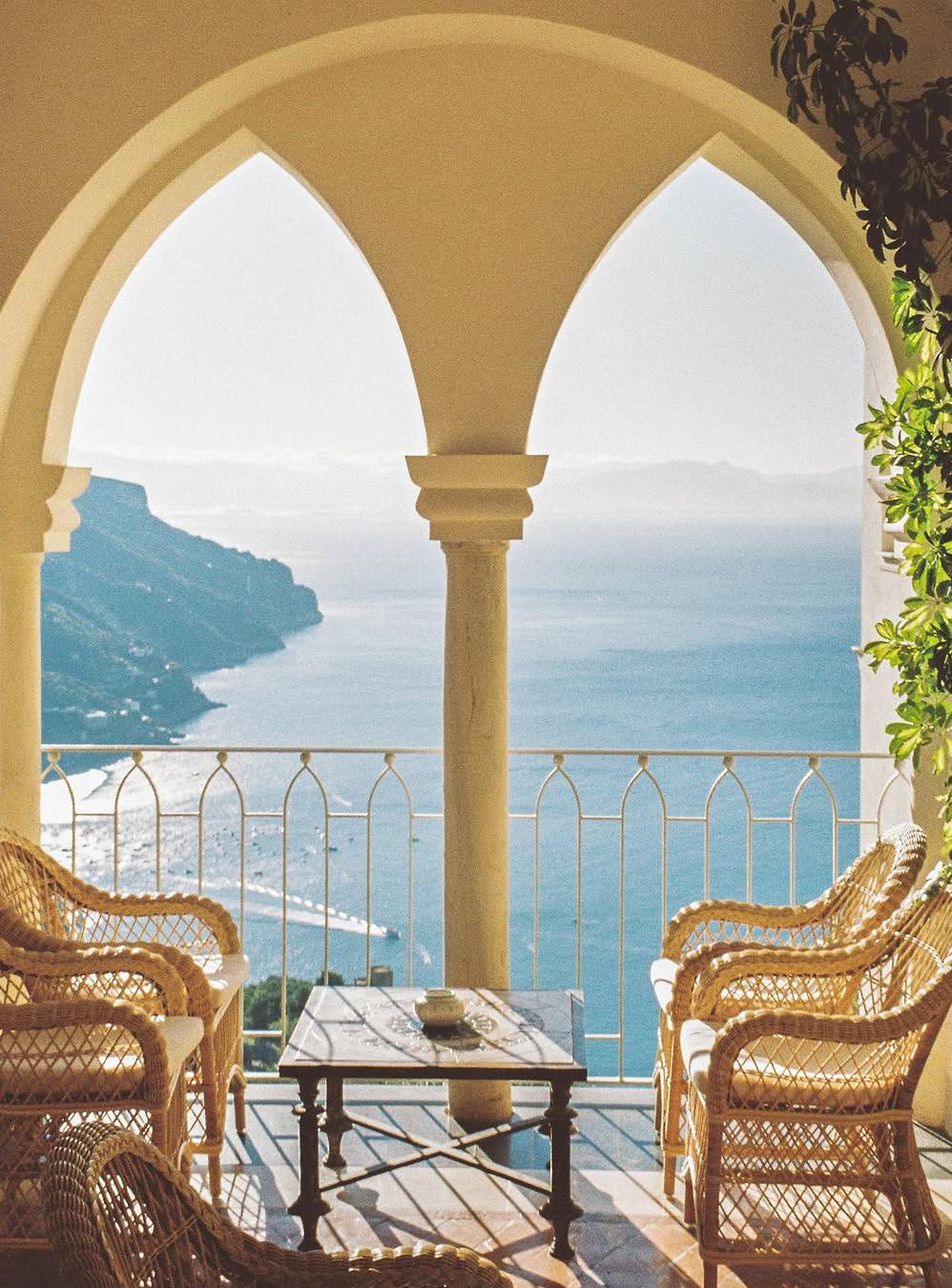

Carved from an 11th-century palace, this legendary hotel occupies one of the most spectacular positions on the entire Amalfi Coast in nearby Ravello. The property's infinity pool appears to merge seamlessly with the Mediterranean horizon, creating one of the world's most photographed hotel vistas. The hotel's terraced gardens showcase centuries-old landscaping traditions, with fragrant lemon groves and Mediterranean flora creating a sensory journey. The property serves as an ideal base for exploring the Amalfi Coast region.
@belmondhotelcaruso
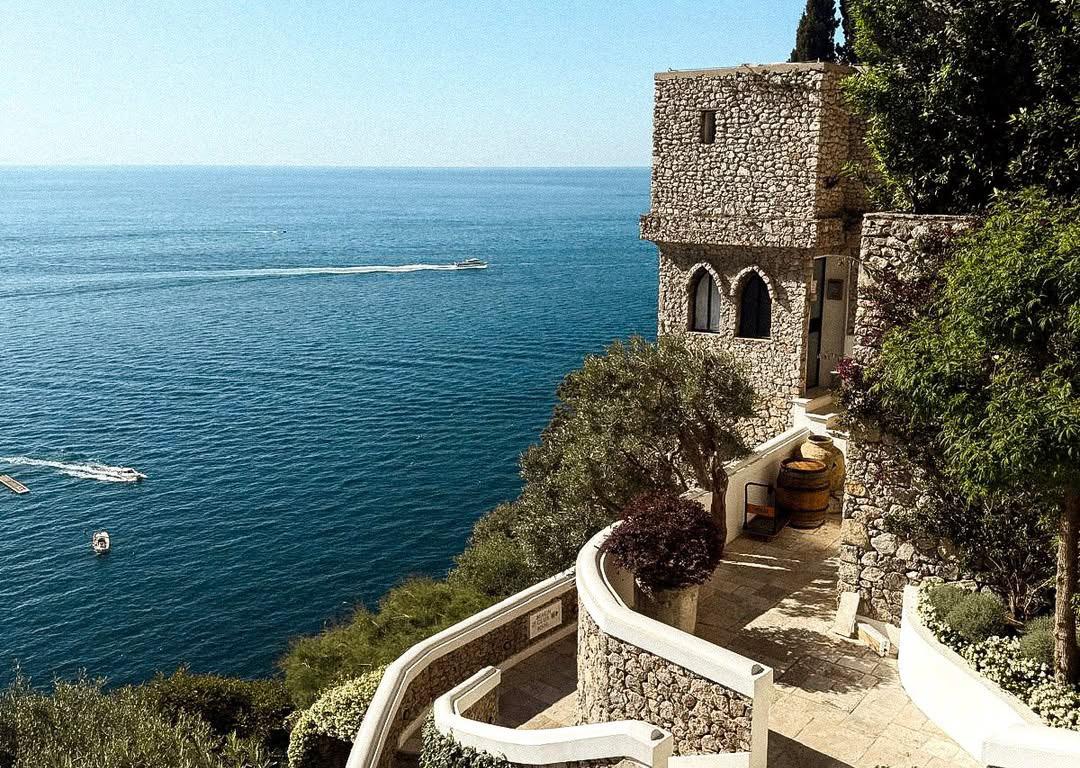



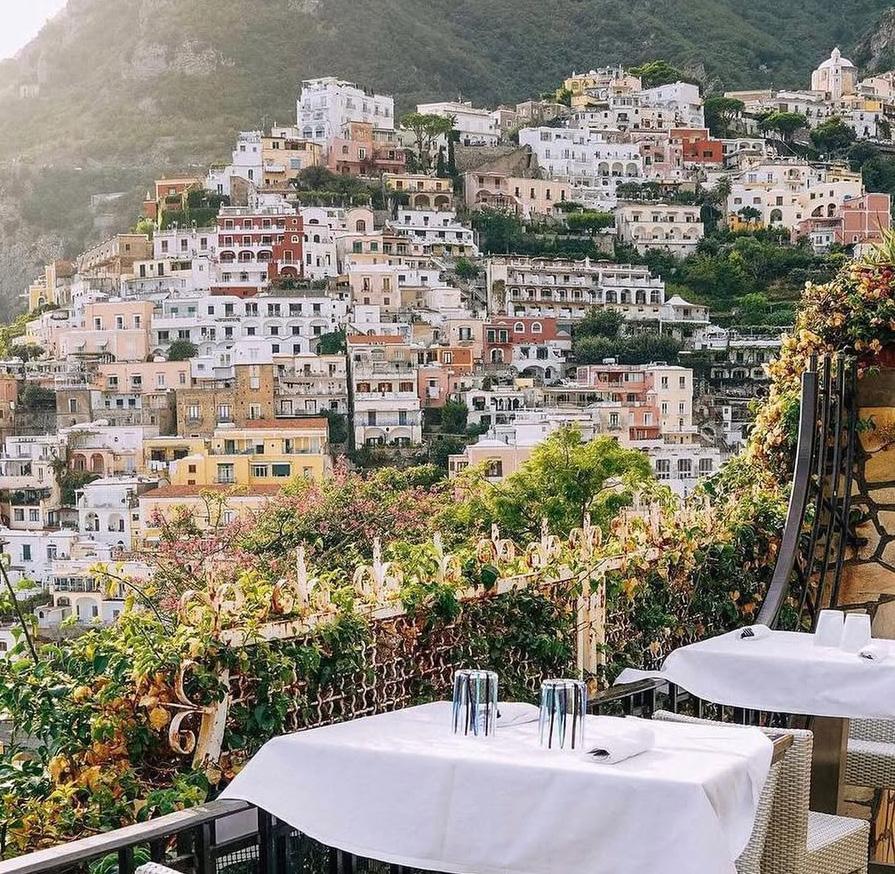
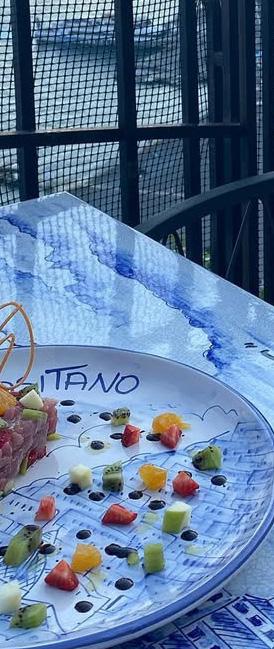
Family-run since 1959, Bruno offers exceptional Italian cuisine on a scenic roadside terrace with breathtaking panoramic views of Positano's iconic silhouette. Traditional blue and white ceramics complement fresh local ingredients and handmade pasta dishes. Evening dining provides particularly spectacular views when the town's lights create magical backdrops. @brunopositano
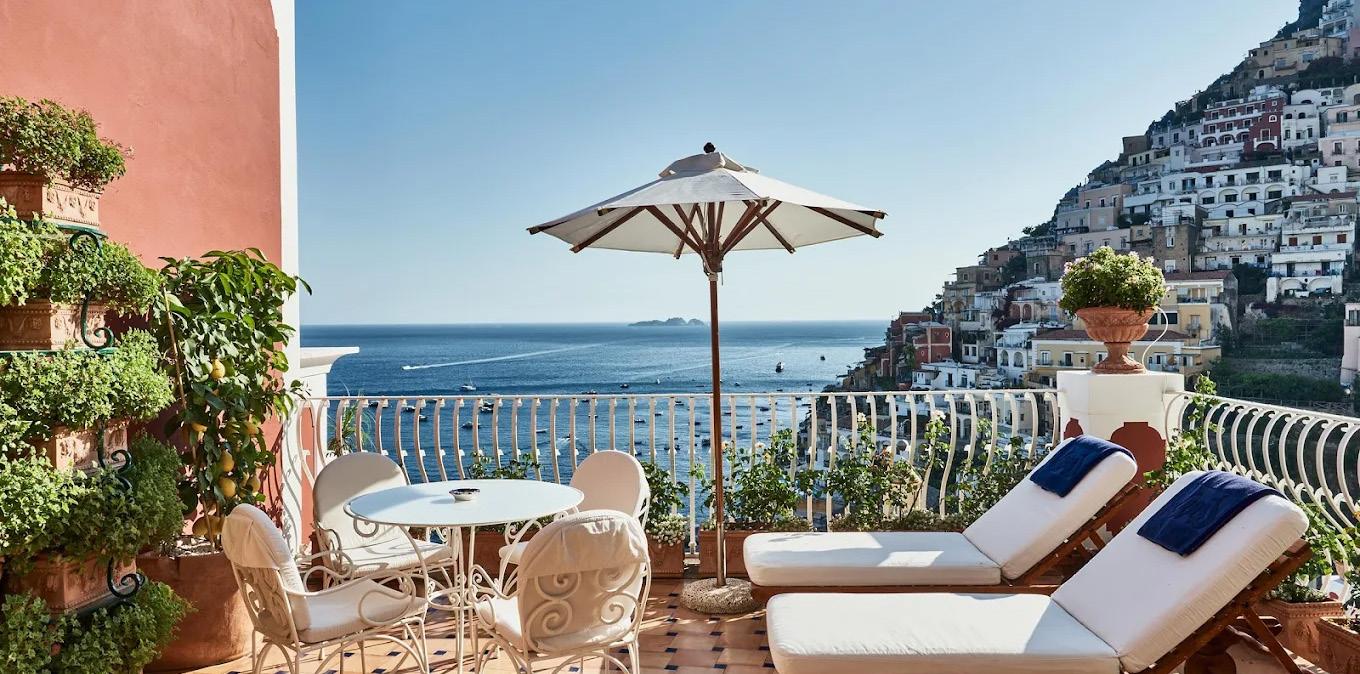
This family-owned luxury hotel has defined Positano elegance since 1951, when the noble Sersale family transformed their 18th-century summer residence into intimate accommodation. Hand-painted ceramic floors, antique furnishings, and romantic terraces overlook the famous cascade of pastel buildings, epitomising refined Italian coastal style. @lesirenuse
days meet the seas.
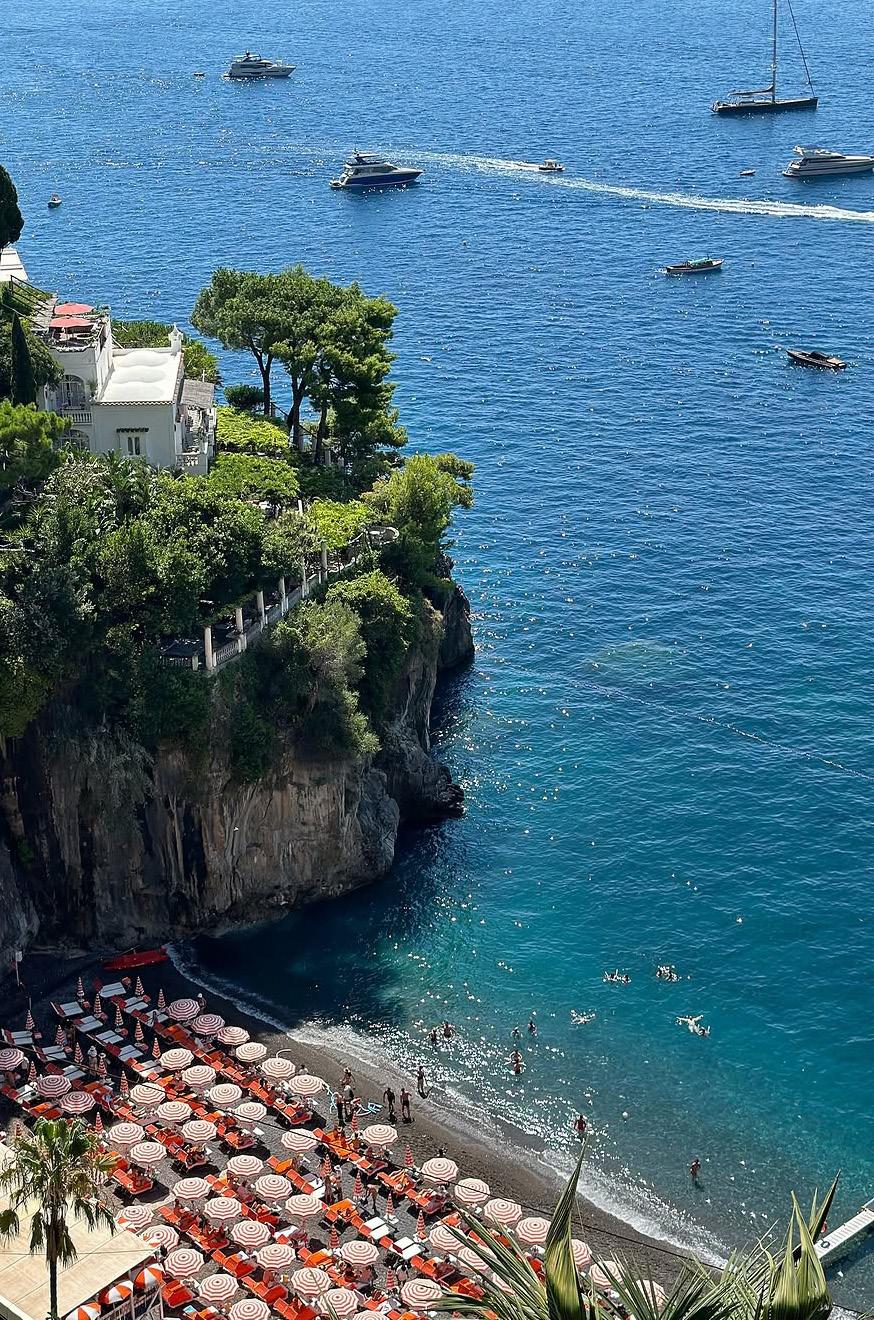
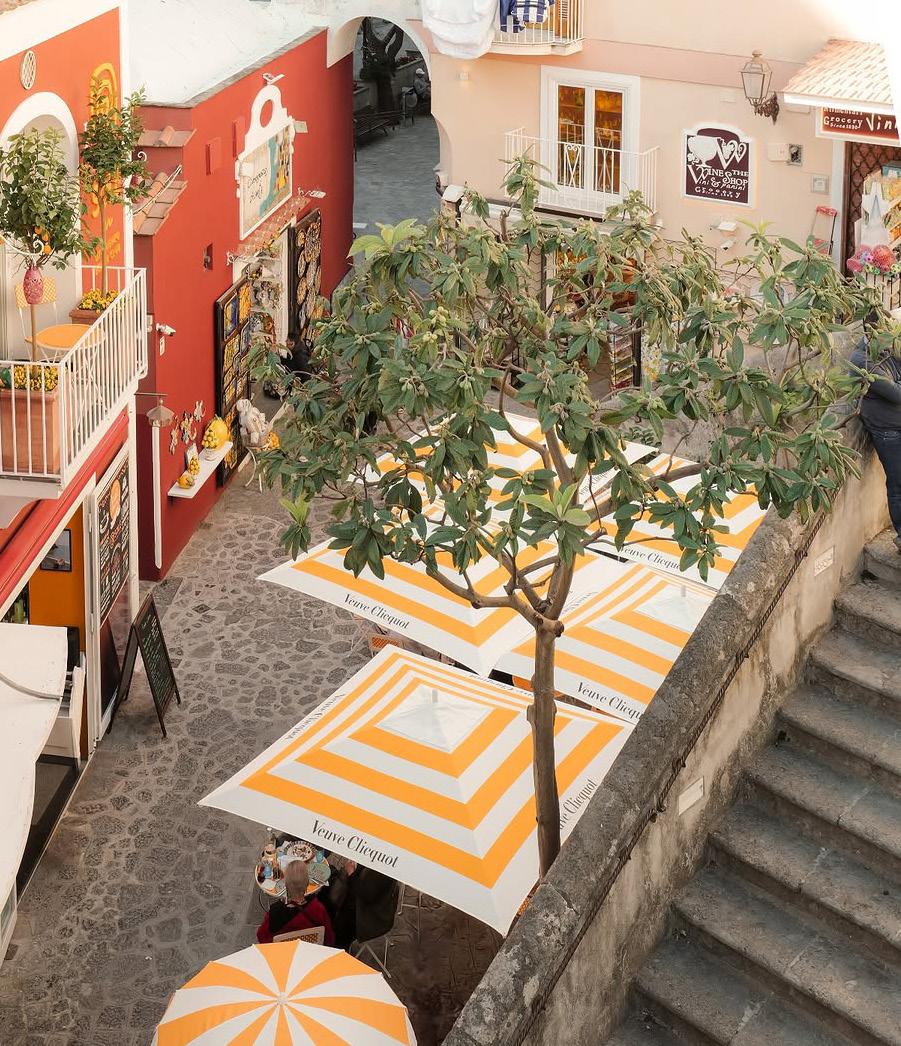
Veuve Clicquot Sun Club at Sole Positano
The prestigious Champagne house brings French Riviera sophistication to Positano through its exclusive Sun Club pop-up with signature solaire yellow branding. RICH and RICH Rosé cuvées, specially crafted to be served on ice, complement sophisticated small plates while bustling back streets create vibrant social atmospheres.
@solepositano
Accessible only by complimentary shuttle boat from Positano's main pier, this exclusive club features iconic orange umbrellas and crystal-clear waters perfect for swimming and cliff jumping. Attentive staff deliver champagne, caviar appetisers, and traditional Positanese cuisine directly to your sunbed on this coastal escape. @arienzobeachclubpositano
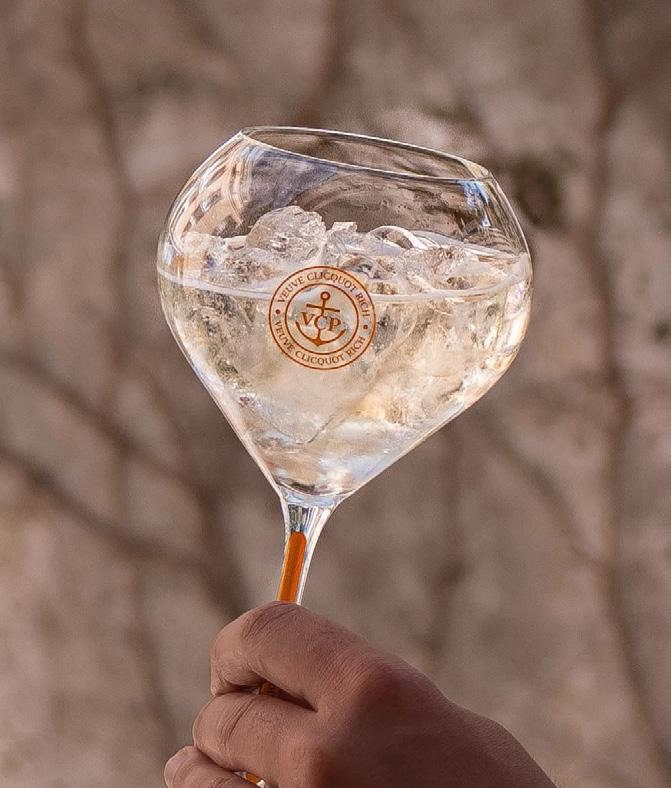
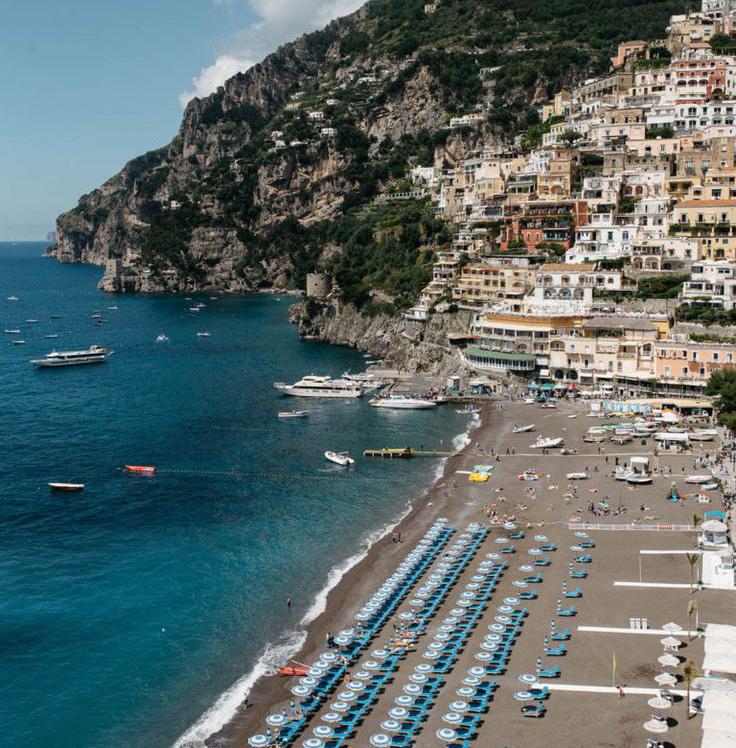
Positano's main beach serves as the town's vibrant heart, where the famous cascade of buildings meets the Mediterranean in a crescendo of colour and activity. This pebbled beach stretches along the Marina Grande waterfront, offering both free public areas and exclusive beach club sections with comfortable sun beds and umbrellas. Numerous beach-front restaurants and bars create a lively atmosphere throughout the day, serving fresh seafood and regional specialities with views of the iconic coastline.

Experiencing the Amalfi Coast from the water reveals perspectives impossible to achieve from land, transforming the journey into an essential part of the experience. Private boat charters allow for customised exploration of hidden coves, secluded beaches, and dramatic coastal formations that define this UNESCO World Heritage coastline. Excursions can include stops at the famous Li Galli islands, the emerald waters of Furore fjord, or extended journeys to Capri's legendary blue grotto.

Fiordo di Furore
This dramatic natural wonder represents one of the Amalfi Coast's most photographed and breathtaking locations, where ancient geological forces carved a narrow fjord into the limestone cliffs. The emerald waters flow beneath a perfectly arched stone bridge, creating that appears almost supernatural in its beauty. Accessible via a coastal path, the secluded beach below offers swimmers access incredibly clear waters surrounded by towering cliff walls. The contrast between the bright turquoise and the weathered stone creates otherworldly atmosphere that inspired artists and photographers generations. During summer months, the beach becomes a gathering for adventurous spirits.
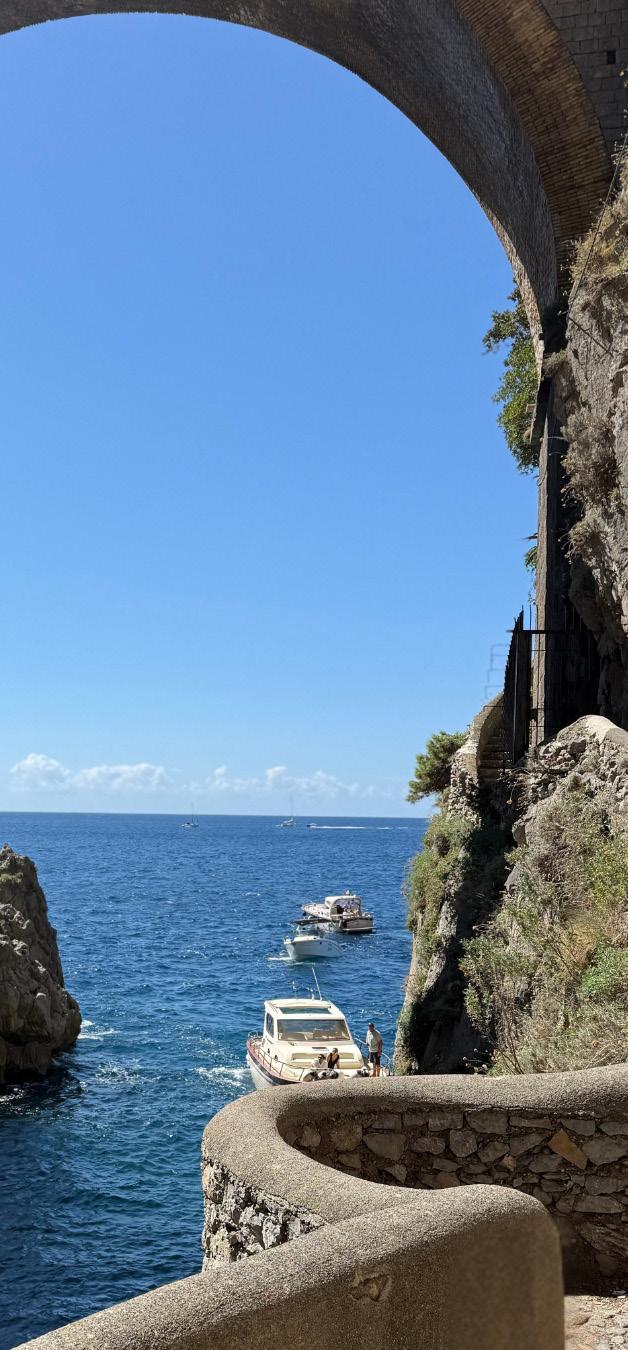
wonder Coast's breathtaking geological into emerald perfectly a scene supernatural steep beach access to surrounded contrast sea creates an has photographers for months, gathering place

This authentic local establishment captures the genuine spirit of Italian café culture in the heart of Positano's bustling centre. Beyond serving exceptional espresso and traditional pastries, Caffé Positano functions as a social hub where locals and visitors
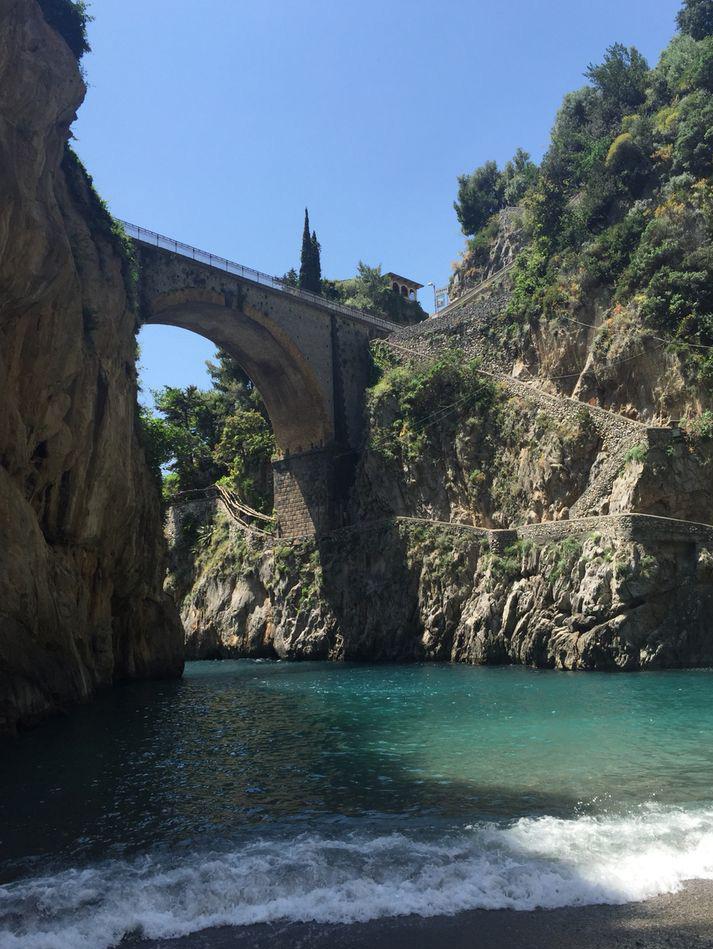
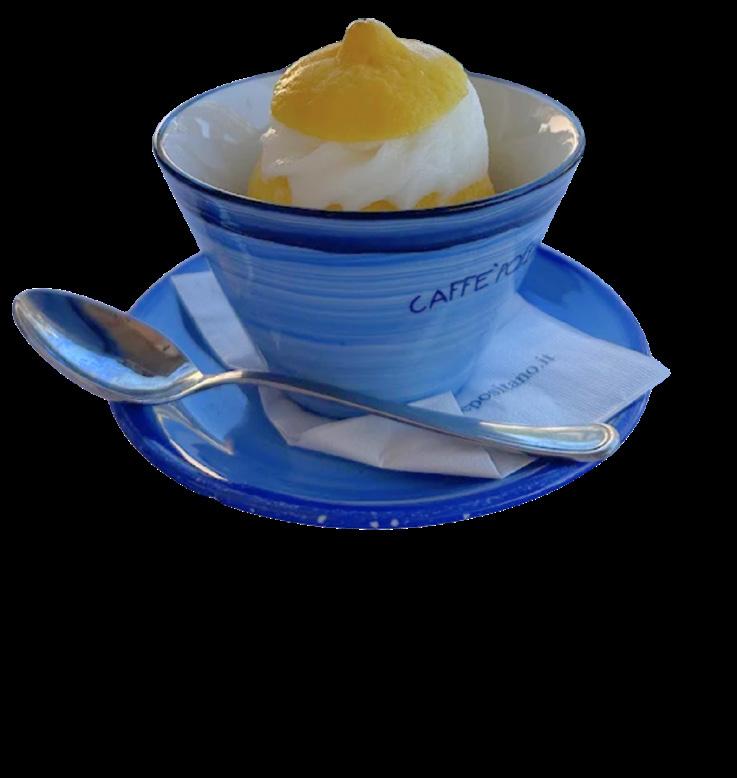
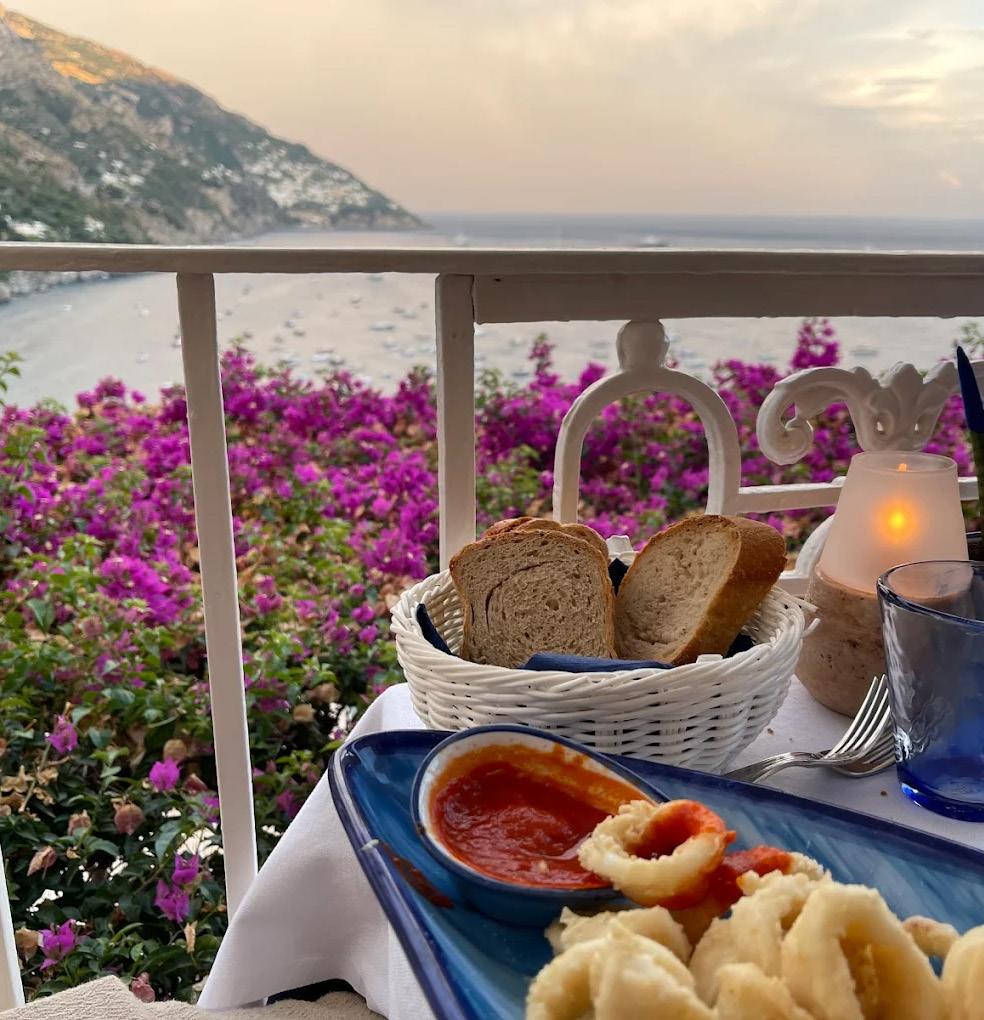
converge to experience daily life in this coastal village. The café's terrace positioning allows for prime people-watching opportunities while enjoying freshly prepared Italian classics. Morning visitors can experience the ritual of standing at the bar for their cappuccino alongside Positano residents beginning their day. The establishment's commitment to traditional preparation methods and locally sourced ingredients ensures an authentic taste of Italian hospitality.
@caffepositanoristorantebar
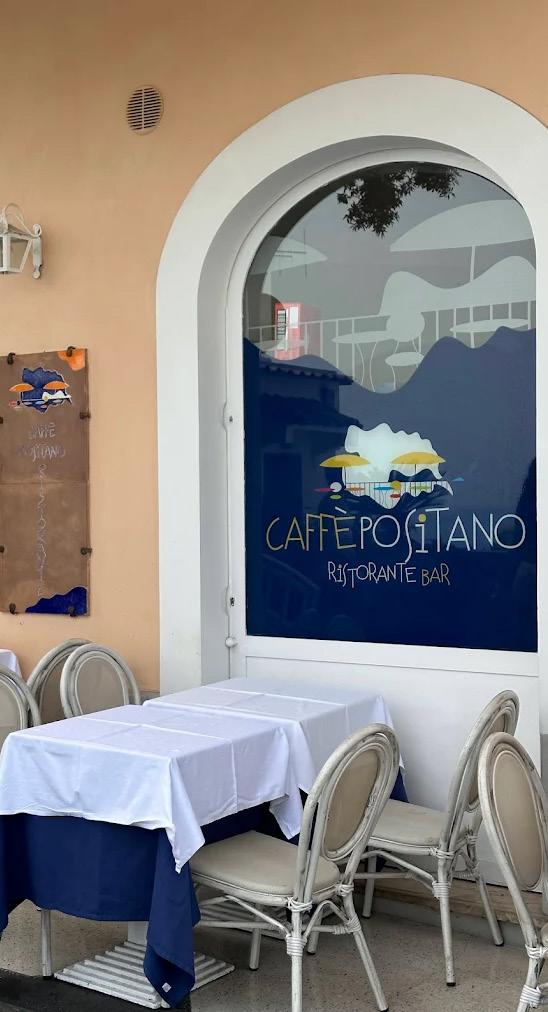
Luminara by The Ritz-Carlton Yacht Collection makes its Maldivian debut

The Ritz-Carlton Luminara, the latest addition to The Ritz-Carlton Yacht Collection, arrives in Maldivian waters this December with two distinctive itineraries that combine luxury yachting with an island resort experience. The 226-suite superyacht will offer guests the opportunity to enjoy a seamless transition between life at sea and the pristine beaches of The Ritz-Carlton Maldives, Fari Islands.
This marks the first time the Ritz-Carlton Luminara has sailed Asian waters, introducing inaugural Asia-Pacific itineraries that promise to redefine luxury travel in the region. The collaboration
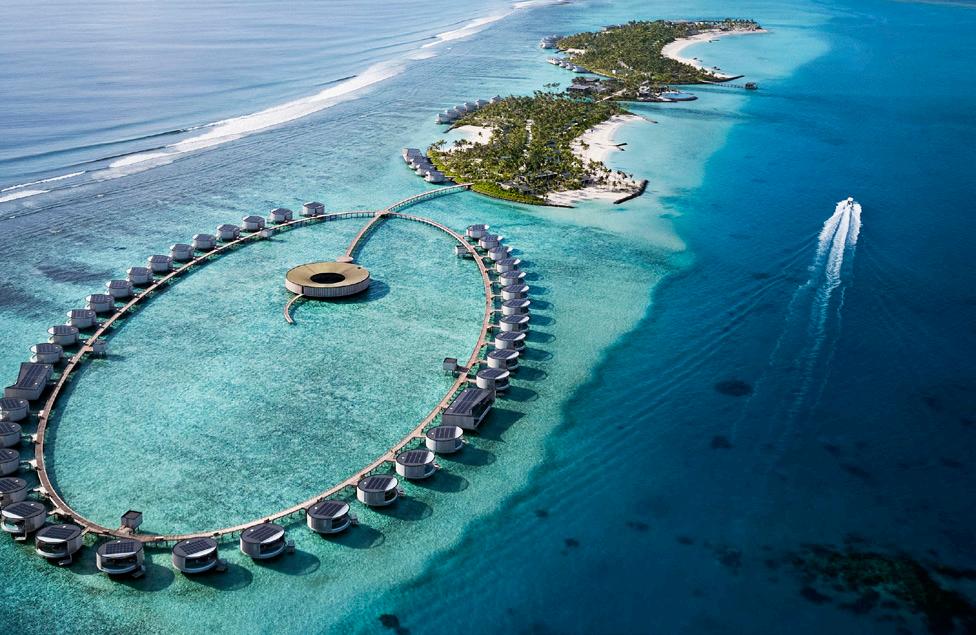
between the yacht collection and the award-winning resort creates a unique proposition for travellers seeking both adventure and relaxation in one of the world's most coveted destinations. Two carefully curated voyages
showcase the versatility of the RitzCarlton Luminara experience. The first itinerary departs Mauritius on 3rd December, taking guests on a ninenight journey through the Seychelles before arriving at the Maldives. Highlights include exploring Mahé's coral gardens and the granite boulder formations of La Digue, offering guests diverse landscapes before reaching their final destination.
The second voyage begins with a two-night stay at The Ritz-Carlton Maldives before guests board the Ritz-Carlton Luminara for an elevennight sailing to Singapore. This route includes cultural immersion in Sri Lanka's Colombo and Galle Fort, a rare visit to the Andaman Islands, and scenic sailing through Phuket and Langkawi's limestone formations. Both packages include accommodation in Ocean Pool Villas, the resort's signature elliptical sanctuaries featuring private infinity pools and expansive sundecks with uninterrupted ocean views. Rates start from USD $12,400 per person, with
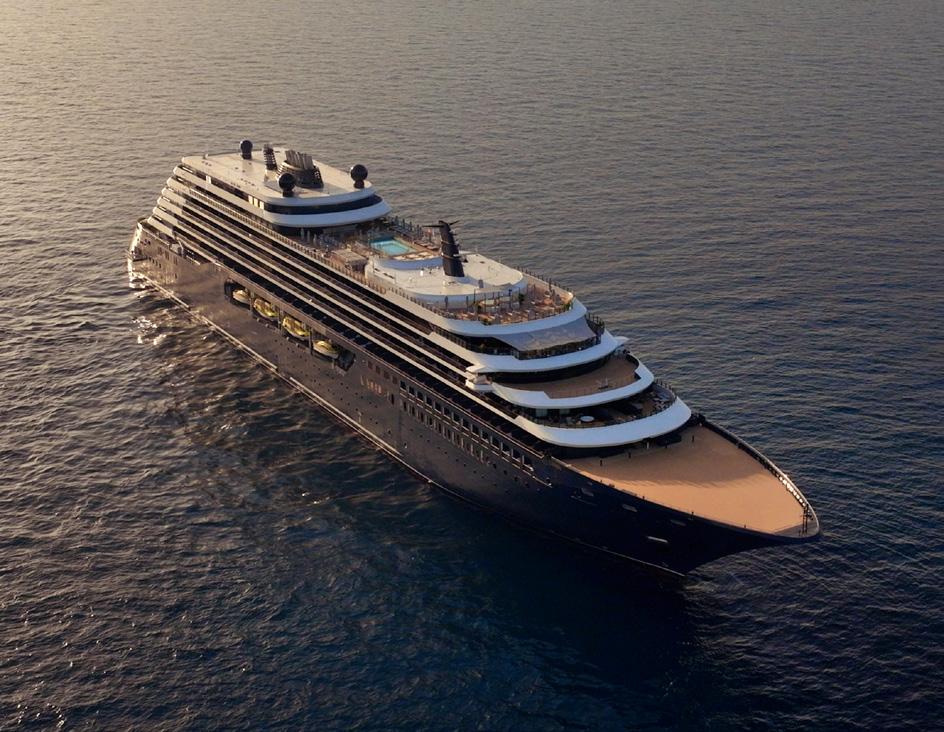
villa upgrades and additional luxury excursions available.
The Ritz-Carlton Luminara represents the pinnacle of ultra-luxury yachting, featuring among the highest employeeto-guest and space-to-guest ratios at sea. Launched in July, this 790-foot superyacht accommodates up to 448 guests across 224 spacious suites, each designed with contemporary craftsmanship and meticulous attention to detail.
This collaboration between the RitzCarlton Luminara and The Ritz-Carlton Maldives offers guests the freedom to experience both the vast expanse of the Indian Ocean and the intimate luxury of an island retreat.
ritzcarltonyachtcollection.com